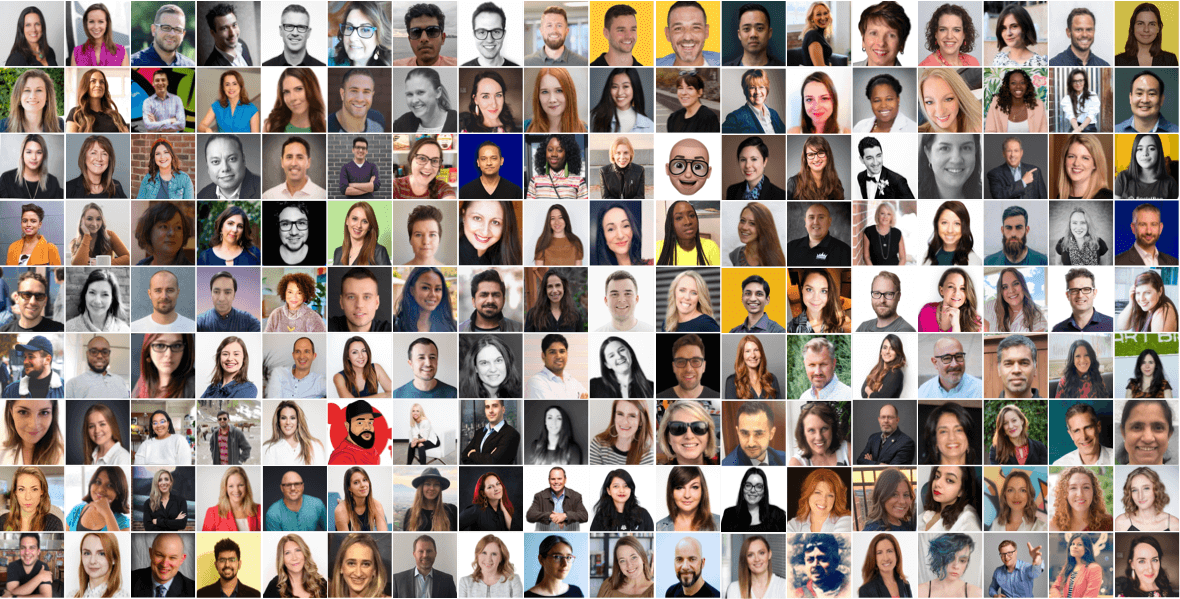2020 was a tough year, we all hope that 2021 will be better.
As 2021 begins this is a good time to reflect on what we learned so far and how the future might look like.
In this comprehensive roundup from 162 marketers you'll find diverse perspectives from a wide range of marketing professionals, founders, and CMOs. The predictions are sorted by categories to make them easier to browse.
You'll notice that a few clear patterns emerge across categories, a number of themes repeat like video marketing, Clubhouse, community, regulation, customer experience, data, and work-from-home.
For your convenience you'll find below a table of contents to make it easier to jump across categories.
Happy learning from the collective wisdom.
SaaS Go-To-Market
Alison Murdock

Alison is the founder at Trusted CMO, where she specializes in GTM strategy & implementation for early stage startups
Alison’s 2021 marketing predictions & trends:
“2020 wasn't the year we expected, and we don't know 2021 will be any different. Marketing teams will need to be flexible on all fronts.
From a hiring perspective, managers will favor candidates—whether revenue ops or product marketing—who have a dash of marketing generalist on their resumes. Who knows when a PMM will have to jump into a customer marketing role. CMOs will look to vendors to be flexible with pricing and this might compromise the precious multi-year martech contract.
Key areas to watch in 2021:
- Virtual event platforms - Virtual events are here to stay. Massive investment in this area (Hopin) has practically guaranteed it. New platforms to check out: Goldcast, Run the World, and Brella.
- No-code anything - Webflow, Airtable, Notion, will become more widely used because they are affordable, easy to use, and super cool.
- Video - Video is about to get much easier to use. TikTok proved that. For B2B, PlayPlay from France is the hottest solution on the market.
- Dashboards - We're over-creating reports in Salesforce and trying to blend in a million metrics together. Dashboards for different roles (HubSpot has this) or data sources (Databox, AllFactors) are where it's at.
- Customer success - officially part of the GTM team. No more won and done. CS has a stake in the adoption and customer marketing game, and that won't end anytime soon as long as every company is a SaaS company.
Follow Alison on Twitter @svrocks and Linkedin Alison Murdock
Whitney Sales

Whitney is Founder and GTM Expert at The Sales Method, she specializes in GTM for early-stage B2B companies (Pre-Seed to Series A stages) and all that it entails.
Whitney’s 2021 marketing predictions & trends:
“Two trends I am particularly excited about, that have been building momentum over the last few years, are product-led growth and the increasing likelihood for companies to adopt the revenue operations function. These two trends, in many ways, go hand in hand.
Bottoms-up and flywheel models have been trends in SaaS for over a decade, these trends have naturally evolved into a focus on Product-Led-Growth (PLG). We've all heard the holy grail of 'build it and they will come' from product/technical founders? We've seen this come to fruition in B2B with companies like Slack, Dropbox, and Superhuman just to name a few, and startups are jumping on the bandwagon.
PLG companies have lower customer acquisition costs and higher retention rates, making the business metrics incredibly attractive. Following these trends, the consumerization of B2B technology over the last several years focussed companies on the adoption and usage of products, forcing simplification of interfaces and user flows for the end-user. In order to optimize these funnels from a business perspective (not just product), companies need to look at the end-to-end customer journeys which include marketing, sales, and customer success driving the adoption of the revenue operation function. Then COVID happened and accelerated these trends.
Companies that previously focussed on in-person or direct channels moved online out of necessity, reducing the potency of traditional marketing strategies, compelling even the most complex, high-cost enterprise solutions to refocus on the digital experience. From my point of view, I can't see a future where these trends don't continue."
Follow Whitney on Twitter @thesalesmethod and on Linkedin Whitney Sales
Nick Bennett

Nick is Director of Field Marketing at Logz.io. Logz is a cloud observability platform for modern engineering teams. The Logz.io platform consists of three products - Log Management, Infrastructure Monitoring, and Cloud SIEM - that work together to unify the jobs of monitoring, troubleshooting, and security.
Nick’s 2021 marketing predictions:
“I believe in 2021 virtual events will take the next step up as marketers are constantly trying to elevate the best way todo them.
So many virtual platforms are out there, but the ones who tie their backend to revenue will end up be the winners for field marketers. Another thing I think is that sales and marketing will continue to move towards a revenue organization and the alignment will prove to get stronger and my hope is things won't be as siloed in the B2B SaaS world.”
Follow Nick on Twitter @NickB2005 and on Linkedin Nick Bennet
Ryan Wardell

Ryan is Founder at StartupSauce, which is a private mastermind community for SaaS founders outside Silicon Valley. Focused on SaaS founders making at least $5K MRR who want to connect with and learn from other SaaS founders - including all the growth hacks and tricks of the trade people won't share publicly.
Ryan’s 2021 marketing predictions & trends:
“From the conversations between SaaS founders I've seen in the StartupSauce Community, 2021 will be the year where deep partnerships between complementary SaaS tools becomes a primary acquisition channel - especially for bootstrapped SaaS companies. Many SaaS categories are now very crowded, with most products having very similar feature sets and price points. Similarly, every year it gets more difficult and expensive to acquire customers via traditional channels like organic search, Facebook and Google ads and direct outreach via email and LinkedIn.
To be successful in 2021, SaaS founders should go beyond Zapier integrations and reach out directly to other SaaS products that are targeting similar customers, and become each other's affiliates. This also means joint content: blog posts, webinars, podcasts, even creating courses jointly. Savvy SaaS marketers can leverage these partnerships to reach new customers with very little upfront cost, and can also use the affiliate income earned by referring customers to offset higher acquisition costs of traditional marketing channels.”
Follow Ryan on Twitter @RyanWardell87 and on Linkedin Ryan Wardell
Jordan Behan

Jordan is CEO at Narrate Creative. Narrate Creative builds content marketing systems for SaaS (software-as-a-service) companies. Jordan is the creator of the Lean Marketing Playbook for SaaS, a program that helps SaaS companies launch a complete content marketing program and sales funnel.
Jordan’s 2021 marketing predictions & trends:
"Clubhouse is already causing a stir so I expect to see the other major social networks scramble to build similar features, the same way we saw "stories" become a feature everywhere we look. Podcasting will continue to grow in prominence and I expect there will be a lot of podcast-adjacent tools available (e.g. tracking analytics and performance metrics for advertisers).
Video will only continue to grow in 2021 too. The pandemic forced all of us to upgrade our video conferencing setups, whether that meant staging an attractive background, installing lights and microphones, or in some cases even rigging up mirrorless cameras in place of webcams. Across the board, I expect we will see even more democratization of video as a tool. Everyone is gaining more experience "on camera" and realizing that not everything needs to be slickly edited or even scripted. I expect that more and more marketing and sales will be done through asynchronous video. All of the players in that space (e.g. Loom, Vidyard, Quickpage, Bonjour) will see spikes in usage in 2021 as more marketers and salespeople use the power of video to help scale and add authenticity to their communications."
Follow Jordan on Twitter @jordanbehan and on Linkedin Jordan Behan
Yash Chavan

Yash is an independent SaaS Growth Consultant. He’s a growth marketing generalist, who’s been the first marketing hire at a couple of startups. He helps product-focused founders find the right channels and create repeatable growth processes for their business.
Yash’s 2021 marketing predictions & trends:
"Down the Funnel Focus - “I believe this decade will see a rise in marketers focusing on down the funnel metrics. So far, marketing is traditionally focused on Awareness and Acquisition, sometimes Activation(through content, demos, etc.). Right now, I see very few marketers focused on metrics like Retention and Referrals, which are more down the funnel.
As Marketing and Growth functions mature, we will see more marketers dive deeper into retaining users and driving more revenue through existing customers via referrals.
As a SaaS consultant, I'm seeing more and more clients talk about needing help with retaining customers. I think Acquisition has an established playbook because it has been worked at for decades. Now is the time to focus on what happens after the Acquisition- that's where the creative marketers will thrive.”
Focus on revenue-driven marketing - “Lots of (especially new) marketers fall for vanity metrics. They're driven by the bling-bling, the stuff that looks good but doesn't translate into real business growth.
Vanity metrics like Followers, Likes, Comments, Site visitors etc. will subside in the coming year. Eventually, we have to realize that our goal is to drive real growth, real revenue. For that, we need to focus on measuring our marketing campaigns by what really matters- metrics like Conversion rate, Clickthrough Rate, CAC:LTV ratio, Churn rate, etc. will gain more prominence in marketing rhetoric.”
Community-driven retention - “I see a rise in the community model of retention. "Come for the product/service, stay for the community". With the rise of vertical SaaS tools, it only makes sense for businesses to create niche communities around their product. This also helps with retention and makes the product stickier.
Plus, especially in increasingly virtual times of today, everyone longs for a sense of community and shared purpose. Adding a community-wing to your marketing efforts will help create a loyal base of brand advocates, make your offering stick, and can also be a revenue source for businesses.”
Follow Yash on Twitter @yctheman and on Linkedin Yash Chavan
Maciej Wilczyński

Maciej is the Owner of the SaaS Consulting Boutique Valueships, they specialize in monetization, acquisition, and retention for SaaS through data analysis and research. They work for companies with established traction above $1M MRR, as well as VCs and start-ups who need to start with the right go-to-market strategy.
Maciej’s 2021 marketing predictions & trends:
"As 2021 progresses, we’ll be moving towards an interim/post-pandemic world, depending on the vaccine distribution development. We don’t know what the future holds, but we know what the past had. Whenever a crisis hits, we see that average profitability drops — considering that this is the essential value driver for companies (check out the reports of FAANG companies to understand their margins better).
One of the things we know about SaaS is that you need to achieve the "Rule of 40%" to ensure good valuation. This rule combines Profitability and Growth. If these two things combined are above 40%, it's a good performance indicator.
In 2020 the ratio of private SaaS companies achieving it dropped from 13% to 7%. What was mostly affected? Of course, profitability.
If you look deeper at the data, we see that the previous growth fuel was depleted. Companies applied heavy discounting for customers and had reduced salesforce, those panic price cuts caused the loss of a lot of value. That's why we believe that in 2021, SaaS pricing becomes more important than ever.
Once the economy rebounds, we expect to see an average of 5 percentage point increase in market prices (tech premium vs. commodity prices). On top of that, we observe more sophistication in bundling and add-on features pricing - this will continue for sure. We expect to see more revenue models based on client-success, e.g. Lambda School or Substack. As we see subscription fatigue, new models are needed.
Our outlook for 2021 is moderately positive, but only for those companies who really look carefully at how they create value."
Follow Maciej on Twitter @wilczynski24 and on Linkedin Maciej Wilczyński
Brad Beutler

Brad is Director of Content at Terminus, as Director of Content at Terminus, he leads and helps with content marketing that powers all stages of our revenue funnel. They primarily target B2B marketers and sellers through a number of different channels, including search, social, email, and display advertising.
Brad’s 2021 marketing predictions & trends:
“Last year, COVID-19 changed a lot of things for marketers. This includes shrinking budgets. Gartner's mid-year CMO Spend Survey reported a 40% decrease in budgets, and Terminus' State of ABM Report found that 48% of respondents' budgets had been decreased.
With that in mind, I think we'll continue to see revenue teams be even more intentional about smart, targeted, efficient marketing. Or simply just doing more with less. This means we'll also see a continued shift from silly "number of leads" metrics to more meaningful revenue metrics.
Lead generation as a goal for modern marketers will continue its descent, while KPIs around new business generation, pipeline acceleration, and customer retention will become even more important.”
Follow Brad on Twitter @bbeutler4 and on Linkedin Brad Beutler
Wes Bush

Wes is a Marketer and an Author of the Product-Led Growth book. He helps Founders and CMOs that want to learn about Product-led growth.
Wes' 2021 marketing predictions & trends:
"This year more marketing teams are going to start leveraging their product to hit their KPIs.
In 2020, we watched ConvertKit create a completely free landing page solution that generated an incredible number of leads for their main email marketing product.
Canva and Soapbox are creating epic landing pages that drop you right into experiencing a particular part of the product.
Just type "how to make a poster" in Google and click Canva's link if you want to see what I mean.
I believe PLG is going to become a CMO's top priority... and if it isn't, it should be."
Follow Wes on Twitter @wes_bush and on Linkedin Wes Bush and on Instagram wes_bush
Gerard Compte

Gerard is CEO and Growth Marketer at FindThatLead and Scrab.in. FindThatLead helps find prospect’s emails on any website and Chrome extension, as well as send emails directly from the platform. Scrab.in is a linkedin automation tool, which helps send messages to 2nd and 1st degree people, download data and find phone numbers and emails.
Both companies help sales and marketing teams generate more leads and automate the sales process.
Gerard’s 2021 marketing predictions & trends:
- Growth Growth Growth - 2021 will be a year of Growth. We will be a sales force more awake than ever testing new ways to engage with customers and give value.
- Digital Events are going to be like the new normal - so make a digital event for your niche asap.
- Be transparent - Show yourself as you are, in your social media and everywhere.
- Outbound Marketing is the new gold. We will see an increased of companies sending cold emails to find new customers."
- Linkedin Automations - More and more companies have said YES to automating their Linkedin.
- Freedom - The work force will have more freedom to work where they wish and make their own schedule.
- Increase in digital nomads - you will have at least one person in each company who will be a digital nomad.
- The world has changed at a speed we have never seen before, so you better take it and make the most of this amazing coming year.
Follow on Twitter @gerardcomptedur and on Instagram @gerardcompteduran
Eric Siu

Eric is Founder and Marketer at Single Grain, they focus on SaaS marketing.
Eric’s 2021 marketing predictions & trends:
"Clubhouse will take off and audio will continue to get stronger. Twitter, Facebook and Google will try to copy this feature.
TikTok and LinkedIn organic will continue to stay strong.
More people will look to buying websites as a way to get stronger in SEO."
Follow Eric on Twitter @ericosiu and on Linkedin Eric Siu
Personalization and Account Based Marketing
Latané Conant

Latané is CMO at 6sense, which is an account-based engagement platform for revenue teams.
Latané’s 2021 marketing predictions:
“Engage the whole buying team with multithreaded approaches:
In today’s climate, every deal counts, so when we lose a deal, it stings more. Marketers have to ask themselves why they’re losing deals. I’d wager a big part of their struggles comes from how we talk about buyers: we’re still discussing “leads” and “contacts” when we should be looking at it from the account level.
That opens the door to multithreading — to appealing to a complex mix of personas and building multiple bridges with an interested account instead of relying on one potentially flimsy connection.
Doing that requires not just another marketing campaign but rather a strategy that ensures buying teams are engaged throughout the cycle. In the coming year, we should invest in developing a solid multithreaded strategy for every account on our lists — and remind ourselves we’re working “accounts,” not leads and contacts, anymore.”
Follow Latane on Twitter @LataneConant and on Linkedin Latané Conant
Rosemary Brisco

Rosemary is CEO at ToTheWeb, a B2B demand generation agency working with determined brands and people to achieve high visibility in search engines and generate leads.
They serve global B2B software companies to drive pipeline leads and sales.
Rosemary’s 2021 marketing predictions & trends:
“B2B companies will focus more heavily on targeting only their known accounts and move away from ‘awareness building’ campaigns. Account-based marketing is a better way for B2B enterprises with long sales cycles to laser-focus their resources.
We will see increased activity toward more granular measurement and reporting for marketing on owned, influenced and paid platforms to find the ‘sweet spot’. We’ll move away from measuring pageviews as a marketing measurement and look at conversion activities instead.
As Google makes massive strides in machine learning and AI, website owners will need to both clean up existing content while changing how they create new content if they wish to move the needle in organic search. The companies that make this shift to high-quality content will win.”
Follow Rosemary on Twitter @totheweb and on Linkedin Rosemary Brisco
Trisha Winter

Trisha is on demand CMO and Product Marketer at Focused B2B, she focuses on technology companies.
Trish’s 2021 marketing predictions & trends:
- Companies will double down on personalization - Cutting through the noise is more important than ever with many target audiences working from home and not attending events. Getting a better understanding of the pain being felt by target buyers and using messaging that keys into solving those pains will break through the virtual clutter.
- Conversational writing will be all the rage - Formal AP writing style isn't {yawn} getting it done. Marketers will start experimenting with (and yes, eventually embracing) conversational writing. Because what do marketers want? That's right, engagement.
- Video assets will become a regular output - I'm already doing lots of virtual video recordings for clients and I only see that growing. Customers and the businesses that serve them are more comfortable with virtual meetings and hitting record to grab video clips will become the norm. And if you develop a format early, it can be super simple and highly effective for social posts and your website.
- In-house will better leverage out-house - Managing marketing freelancers and contractors is actually easier (and more cost effective) than managing virtual employees. Now that many marketers work remotely, savvy marketing leaders will begin to take better advantage of the resources in the gig economy and thrive because of it.
Follow Trisha on Twitter @TrishaWinter and on Linkedin Trisha Winter
Mariia Lo

Mariia is Founder at Emailix, she helps with email marketing strategies for e-commerce and SaaS businesses.
Mariia’s 2021 marketing predictions & trends:
"In 2021 we should finally accept that nothing is going to be the same. In the face of an unstable economic future and a global crisis, businesses still find themselves struggling. But it doesn't mean that it is impossible to solve this.
The main challenge will be changing the way businesses embrace technology to support and empower their marketing teams. The focus will be on creating more personalized content with specific expert information to reach the right ICPs using AI-technologies and creating that brand ecosystem that will provide real-time information about customers.
Remember that by 2022 companies will face the "death of the third-party cookie" that means this year companies need to review their methods of getting more personalized data and working with existing clients to encourage referral and word of mouth.
This also means that retention should be prioritized over acquisition due to increasing costs on marketing and competitiveness. Businesses should work with their communities and use an omnichannel strategy through email and messengers to adapt their communication to each client."
Follow Mariia on Linkedin Mariia Lo
David Crane

David is VP of Marketing at Intentsify, a software that makes intent data more actionable and impactful for B2B marketing teams. Their solutions convert intent insights into actions via demand generation and programmatic advertising campaigns, helping B2B marketers efficiently scale account-based demand and pipeline velocity.
David’s 2021 marketing predictions & trends:
"Marketing teams will struggle to accurately time the relaunch of in-person event initiatives. Too early, and they’ll risk offending audiences by appearing unconcerned with the pandemic’s effects. Too late, and they’ll miss opportunities to tap into the pent-up demand for in-person interactions among their target audiences (most of whom are likely suffering from “virtual burnout”). Struggling with this shift back to normalcy will put added pressure on teams to decide how and when to reallocate spend between channels to achieve the strongest pipeline contribution.
In the meantime, marketing orgs will strive to make up for lost opportunities typically generated via in-person events by continuing to focus on and optimize their digital account-based engagement efforts. Gaining better target-account insights and working out how best to act on them will be paramount. It will also result in teams investing more heavily in third-party intelligence, such as intent data. In fact, aggregating several intent feeds to both broaden coverage of target-account activities and corroborate intent signals against each other will become the norm rather than the exception. This, in turn, will result in teams leveraging intent data for a wider range of use cases throughout the buyer’s journey—including events."
Follow David on Twitter @davidfcrane and on Linkedin David Crane
Madalena Costa

Madalena is a Marketer at Myaris Consulting, specializing in business consultancy and social media marketing. They look to help entrepreneurs to create and scale their dream business.
Madalena’s 2021 marketing predictions & trends:
"How can a brand communicate to millions of different people worldwide and in various online channels, in these unprecedented times that we live? Through personalization.
The change in consumers' behavior, moving to a more rapid, online world, forced brands to find alternatives in communicating with their customers. Customers want brands to know what they are looking for, which can only be achieved through personalization.
This year, there will be a shift in how brands embrace technology to adapt to customers' changing needs, through e-mail marketing and online advertising personalized to each customer individually."
Follow Madalena on Linkedin Madalena C.
Wendy White

Wendy is CMO at Egencia. Egencia is corporate travel management for companies around the globe
Wendy’s 2021 marketing predictions & trends:
"We’ve all seen the fast-growing trend around outbound sparked by the rise of innovative engagement platforms like Outreach. Sales and SDR teams are perfecting their prospecting motion with the tools in combination with smart intent data and contact data. But, driven by increasing CMO accountability for revenue metrics, more CMOs will embrace outbound as part of a truly integrated marketing and sales motion.
More CMOs will dedicate marketing staff to leveraging engagement platforms to deliver a programmatic approach around persona-drive outbound sequences, A/B test strategy, data and list strategy as a core part of ABM. Will this stop sales teams from complaining about “not enough leads?” Probably not in 2021, but hopefully those days are numbered."
Follow Wendy on Twitter @wendywhite and on Linkedin Wendy White
Caroline Tien-Spalding

Caroline is CMO at Aptology. Aptology helps find the right fit for employees. Understand what behaviors make for a great fit; then hire, coach and develop based on that knowledge to improve revenue, diversity and happiness.
Caroline’s 2021 marketing predictions & trends:
"2021 is the year of 360 personalization or “B2Me”. What does that mean? Starting from discovery, prospects will have access to all the information and answers they need to delve into their problem and evaluate solutions.
They will have behaviorally targeted outreach based on a deep understanding of where they are in their evaluation; tailored presentations; and seamless onboarding. They will have self service access to products and services on demand, and self timed renewal and referrals. The future is personalized - and not based on company size or type, or by title of the individual; it will be personalized based on behavior."
Follow Caroline on Linkedin Caroline Tien-Spalding
Matt Heinz

Matt is Founder and President at Heinz Marketing Inc, they help growth-oriented companies create predictable, marketing-driven pipelines in complex buying environments.
Matt's 2021 marketing predictions & trends:
- We’ll stop using the phrase “account based marketing” and refer to it instead as “account based go-to-market”. This is a company wide motion and culture change, not a marketing initiative. It will also just become standard “how we do business” for many companies vs a new shiny object treated and managed separately."
- More marketing leaders will embrace their role as business drivers across the leadership team, especially in managing the entire customer experience, product experience and measured market opportunity."
- In addition to integrating more tightly with sales, marketing efforts will more tightly integrate with customer success, account management and product marketing disciplines. One customer, one journey."
Follow Matt on Twitter @HeinzMarketing and on Linkedin Matt Heinz
Communication Channels, Reach and Messaging
Laliv Hadar

With over 20 years of experience in strategic and digital marketing, Laliv is VP of Marketing at Invision Communications, a full-service audience engagement agency. They move people to action through integrated experiential, design, digital, and communications campaigns anchored in strategy, creativity, and technology. Their clients are world class brands in Tech B2B and Health Sciences (e.g. ServiceNow, Oracle, Siemens, and Dell). Laliv is also board member of the American Marketing Association SF & Silicon Valley.
Laliv’s 2021 marketing prediction & trend:
"Following the disengagement created by the global pandemic, 2021 will tap into the human need for audiences to connect. To meet audiences’ desire for connection — while also accounting for the very real health risks, anxieties and regulations that remain — marketers will plan their 2021 initiatives with a new vision of human-to-human engagement in mind that optimizes limited live interactions with digital channels.
Successful hybrid events will require confidence-inspiring safety protocols, healthy demonstrations of empathy and agility, and clear and abundant communication. Specifically, we expect to see three versions of hybrid: 1) Traditional Hybrid, where a small audience gathers face-to-face, with health safety protocols in place, while a larger one engages live online; 2) Hub and Spoke, where one central face-to-face event is complemented by a collection of local gatherings with strict health and safety; and 3) Multilocal, where many locations conduct the same event concurrently, sometimes connected by technology.
These hybrid experiences will enable marketers to deliver face-to-face connections in a way that’s safe, while complementing them with digital extensions that are scalable. They’re also experiences that can be readily adapted as scenarios unfold."
Follow Laliv on Twitter @lalivhadar and on Linkedin Laliv Hadar
Suan Yeo

Suan is co-founder of Porterhouse - the only app that sends mass iMessages with 1 click.
It’s perfect for anyone wanting to send personalized mass texts from their own number, such as small business owners, real estate investors, and personal trainers.
Suan's 2021 marketing prediction & trend:
In 2021 text marketing will overtake email in certain segments. We’ve already seen this happen in areas such as fundraising.
Over 90% of texts are read within 3 minutes, with a whopping 99% read within 20 minutes. Compare this to email, which averages a paltry 15-25% open rate, not to mention email providers getting more aggressive at labeling emails as “promotions” such that they don’t even reach customers’ eyes.
Especially for smaller businesses, texting is a far more personal way to build connections with customers, gain loyalty, and have real conversations.
Follow Suan on Twitter @suanyeo
Ariana Lena

Ariana is Email & SMS Marketing Coordinator at The Snow Agency specializing in Email & SMS for e-commerce.
Ariana's 2021 marketing predictions/trends:
"Email was proven to be very successful in 2020 due to obviously the pandemic. For a lot of big brands and even small ones, that is the tool that they had to use to get in communication with clients. There's no doubt that in 2021 it will continue to be even more successful. Some may say that email marketing is over-saturated and not an innovative tool anymore, compared to SMS (which I'll get to as well). However email I think will continue to be a strong tool for brands because that is the link to get to customers and is HUGE for brand engagement and loyalty. There's so much you can implement to increase revenue like setting up multiple flows based on customer's behavior.
In regards to SMS, that will also continue to grow. I will say anyone should take a hesitant approach to SMS marketing and not be super aggressive since that can result in high unsubscribe rates but like email, you can really target customers based on behavior as well. With 2020 turning into the year of e-commerce, that has definitely kickstarted the growth of SMS. According to Attentive’s studies, out of 2,000 US customers, 75% said that they shopped online more in 2020 than they did in 2019, and by August, 60% of US online retail visits came from mobile.
Therefore for 2021, we don't see the momentum stopping. 2021 you'll see more brands adopting SMS into their marketing strategy and the results will be explosive. Attentive is even planning to set up even more strategized tools to make the shopping experience via mobile more convenient, as if your phone is your personal shopper. Not to mention, with segmenting strategies, as a marketing professional you can target those who've purchased or haven't purchased and increase revenue."
Follow Ariana on Twitter @arianalena_, on Linkedin Ariana Lena and on Instagram arianakl_
Dennis Yu

Dennis is Founder and Marketer at Blitz Metrics, he specializes in social media marketing.
Dennis’ 2021 marketing predictions & trends:
"2021 is the year of OWNED MEDIA. With all the backlash on social media, accounts getting banned, ads getting disapproved, and reach disappearing, we realize the need to not rely so heavily upon rented land. We need to make sure we have our website and email list driving sales for us. Use social media as a content production vehicle to strengthen your email and site.
Because of TikTok, Clubhouse, and so many places to be-- on top of Facebook, LinkedIn, Twitter, email, our website, and so many other channels--- smart marketers will focus on reusing content. It's impossible to be everywhere all the time, so we have to be strategic about creating once, publishing everywhere.
Think of social media as content generation and content production-- to drive to our OWNED MEDIA of the website and email. Take a multi-pronged approach this year instead of betting on just one channel. You can have your cake and eat it, too."
Follow Dennis on Twitter @dennisyu and on Linkedin Dennis Yu
Merisa Lewis

Merisa is the Owner and Marketing Strategist at Lewis Marketing, a full service digital marketing agency. Focused on email marketing growth strategies for small businesses and startups who are focused on scaling to 6 figures.
Merisa’s 2021 marketing predictions & trends:
"Email Marketing will emerge as the primary method of communication for B2B and B2C
Email marketing continues to be the channel with the highest ROI. According to Hubspot, every $1 spent on email generates $38, a 3,800% ROI. (Hubspot, 2020). During COVID-19, we saw an increase in email communication amongst businesses during and after the lockdown. Consumers were forced to rely on online mediums as a source of entertainment and leisure. Email communication provided a way for you to sell products and services to your customers without putting anyone's life in Jeopardy. Email marketing doesn't have to change algorithms much like social media, making this channel more effective in getting your messaging to your audience.
Email Newsletters are a perfect solution for extending your brand's identity. Emails allow you to be personable and authentic with your target audience. It can be something simple as personalizing the opening line or sending your customer an automated Happy Birthday email. For your business to capitalize on this trend, you must have a strategy in place. Sending out one email and expecting great results won't do the trick. Understand your audience what message they like and dislike, what freebie or discount will entice them to sign up for your email list.
If you haven't invested or used email marketing as a channel for your business, you’re missing a potential revenue stream."
Follow Merisa on Twitter @LMerisa and on Linkedin Merisa Lewis
Julie Davis

Julie is the Owner and Content Strategist at Tiny Buffalo Consulting, they specialize in content marketing strategies for B2C entrepreneurs and small businesses who are ready to scale.
Julie’s 2021 marketing predictions & trends:
"With everything that people are juggling during a global pandemic, convenience will be king in 2021. The current reality means you need to make it as easy as possible for people to engage with you and buy from you.
When it comes to social media, how can you create a frictionless environment for potential clients and consumers to buy from you? Social platforms are consistently moving towards consumers buying straight from the platform instead of going off-site. Whether that means setting up a Facebook or Instagram shop or consistently leading people to connect with you in DMs through your content, make it as easy as possible for people to work with you!
Personal branding is also on the rise. It's hard to imagine successfully establishing your personal brand without utilizing livestreaming in your content strategy. People want to connect with the most REAL (and raw!) YOU. The great thing about livestreaming is that it's not a one-and-done affair, you can repurpose a livestream in multiple ways to fill out your weekly content strategy and fortify your personal brand even further."
Follow Julie on Linkedin Julie Davis, on Instagram @tinybuffalo_consulting and on on Twitter @JuliePDavis2
Auseh Britt

Auseh is VP, Growth Marketing at Terminus. Terminus provides an account-based marketing platform for go-to-market teams to target, reach, and engage their best-fit accounts.
Auseh’s 2021 marketing predictions & trends:
"2021 will be the year of engaging your target audience in new and creative ways. With the increase in spend in digital marketing due to the bump in the work-from-home environment, brands need to look into new channels and methods to reach and engage customers and prospects, like streaming audio, connected TV, and podcast advertising.
Content formats will also become more interactive with more dynamic web pages, use of chatbots, quizzes, and more visually appealing content like infographics (vs. a traditional ebook or whitepaper)."
Follow Auseh on Linkedin Auseh Britt
Tami McQueen

Tami is VP of Marketing at BIP Capital. BIP Capital is one of the most active Venture Capital firms in the Southeast, serving entrepreneurs, investors, and operators to grow the emerging company ecosystem in our geographic area. They focus on Enterprise SaaS, Healthcare IT, Digital Media, Dev Tools, and MarTech.
Tami’s 2021 marketing predictions & trends:
“Full capacity in-person events will not resume until 2022 so marketing teams will need to focus on elevating digital experiences and building communities. Shifting in-person experiences as we know them to an online platform will continue to fatigue audiences and viewership will decline over time. Custom digital engagements targeted toward micro communicates, (such as Slack channels, Clubhouse rooms, Live AMAs, Roundtables), will allow makers and creators to reach their customers and audience at greater scale than ever before.
Without borders to disrupt digital connectivity, the world opens to new ideas and accessibility to innovation. We’ll see more competition across digital streaming platforms, employee engagement tools, and asynchronous communication platforms. There’s never been a better time to create digital experiences for customers around the world than right now.”
Follow Tami on Twitter @tami__mcqueen and on Linkedin Tami McQueen
Liz Willits

Liz is Email Marketing + Copywriting Consultant at her own practice Liz Willits Marketing, she focuses on ecommerce SaaS companies.
Liz's 2021 marketing predictions & trends:
"Email marketing will still be one of the most effective sales and marketing channels for businesses in 2021, and we'll see even more businesses focus on building their email lists.
Email remains effective because of the ownership it gives businesses. Unlike with social media where you're reliant on an algorithm or advertising where you pay to play, email marketing gives companies control over their strategy, their subscribers, and their costs. Plus, it's insanely effective at driving sales."
Follow Liz on Twitter @lizwillits and on Linkedin Liz Willits
Jackie Hermes
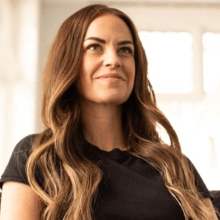
Jackie is Founder and CEO at Accelity, they do marketing, brand/awareness building, and generating conversation-ready leads for B2B SaaS companies.
Jackie’s 2021 marketing predictions & trends:
“Everyone got pounded with emails last year (billions more than 2019, in fact). Only the most creative marketers are getting through to consumers via email—so there is a major upskilling opportunity for email marketers.
I think brands are likely to come back into focus, and I would like to see companies allowing employees to have personal brands as well. The culmination of the personal brands of your people can bring a lot of attention to your company... after all, we are all humans marketing and selling to other humans.”
Follow Jackie on Twitter @TheJackieHermes, on Linkedin Jackie Hermes
Nikola Cvetkovic
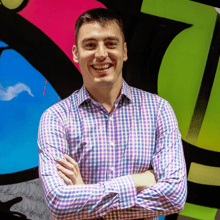
Nikola is Founder and CEO at Emitto, they help enterprises, marketing agencies and eCommerce brands engage with their customers, through direct messaging using channels such as SMS, Viber, FB Messenger, WhatsApp, etc. without writing a single line of code.
Nikola’s 2021 marketing predictions & trends:
"The next big thing in 2021 will definitely be Messaging Marketing. We’re in the era when the human touch is essential, and that’s exactly where messaging marketing shines: 1-on-1 highly personalized communication, at scale.
Messaging marketing shows open rates greater than 80% in the past year as well as a click-through rate greater than 30%, which is more than 10x more efficient than email marketing. Since everyone (yes, even your grandma) is always on their phone, 83% of the messages sent are seen within 3 minutes. From what I’ve seen while working in the Messaging Marketing industry and data at my disposal, it’s the hottest digital trend and I expect an increase of 80% YoY of the volume of marketing messages sent through messaging apps. I’d advise businesses to test these channels out as it will be the hottest marketing trend in 2021!"
Follow Nikola on Twitter @CvetkovicNikola and on Linkedin Nikola Cvetkovic
Eman Zabi

Eman is Founder and Copywriter at The Scribesmith, they specialize in digital product and course launches. They recently launched our own e-learning platform for small businesses.
Eman’s 2021 marketing predictions & trends:
"E-learning and e-commerce are going to be massive in 2021. But at the same time, selling is likely to be harder in 2021, the economic toll of the pandemic means that consumers are going to be risk-averse, more careful with their money, coupled with everything happening at Facebook, and you've got a tricky situation.
It's never been more important to have a strong, conversion copywriter on your team. And if it were me? I'd be dedicating resources towards keeping my email list as healthy as possible, right about now."
Follow Eman on Twitter @eman_zabi, on Instagram @eman.zabi and on Facebook @thescribesmith
Interactive Content and Marketing
Ryan Bonnici

Ryan is CMO at Whereby. Whereby is the world’s easiest to use video meetings platform. One-click video meetings with no software to download.
Ryan’s 2021 marketing predictions & trends:
“As video meetings became the new normal in 2020, in 2021 I think we can expect to see more consumers demand easier access to services they were able to receive remotely.
With that, I think you will see an evolution of video-as-a-service, where tools like Whereby Embedded will be built-in to SaaS websites and apps, empowering businesses to connect with their consumers in more ways.”
Follow Ryan on Twitter @ryanbonnici, on Linkedin Ryan Bonnici and on Instagram @ryanbonnici
William Careri

William is Chief Operating Officer and Senior Growth Consultant at Waylan Consulting Group, the specialize in outbound marketing automation, targeting B2B SaaS and Service companies.
William’s 2021 marketing predictions & trends:
"We are going to see a large increase in interactive content during 2021. As a result of the lengthy buying cycle and layers of decision making B2B entails, SaaS startups have to speak convincingly and compellingly.
Unfortunately, with the move to predominantly remote work in 2020, all of which has lasted longer than I believe most anticipated, email and LinkedIn inboxes are already flooded with long bodies of text with lackluster pitches. While companies like Typeform and VideoAsk have been offering more UX-friendly and interactive ways to pitch/communicate, we are going to see a demand for it from unknowing target audiences. While someone may not know they want a short, interactive video, we've found a higher conversion rate during split tests with traditional copy pitches.
Conforming your strategy to a 6-second attention span will be the key to success in 2021 with interactive content being the leader in this conversation."
Follow William on Twitter @WCareri and on Linkedin William Careri
Jenna Urben

Jenna Founder and Content Creator The Urben Life, she’s a food and lifestyle blogger featuring allergy-friendly recipes. Her background in social media marketing led her to become a blog consultant for bloggers wanting to learn how to establish their brand, serve their audience, and monetize their influence.
Jenna’s 2021 marketing predictions & trends:
"With the rise of short-format videos, we can expect to see a push for highly visual snackable content across all platforms.
Instagram Reels, YouTube Shorts, and Web Stories are all great places to get started!"
Follow Jenna Urben on Twitter @theurbenlife, on Linkedin Jenna Urben, Instagram @theurbenlife, and YouTube Jenna Urben
Robin Copernicus

Robin is Growth Marketer at his consultancy Robin Copernicus. Robin helps Visionaries launch their idea and get paying customers without relying on pitch decks, business plans, or venture capital.
Robin’s 2021 marketing predictions & trends:
"There are two major trends emerging in 2021.
First, there’s no question that 2021 is the year of voice. We finally have the infrastructure to make it possible. Our homes, cars, and offices are now equipped with Alexa, Siri, and Google. This will drive the need for VSO (voice search optimization).
The pandemic has left us wanting for human connection. This will drive the need for voice oriented apps such as Clubhouse and Zoom to help facilitate that.
Second trend, a subtle but difficult-to-ignore macro trend is the continued growth of vertical startups and vertical brands. Vertical startups are companies that focus on delivering value to a hyper focused niche.
One example of a vertical company is Moment. Moment builds and sells accessories for mobile phones. The customer experience at Moment is custom tailored for one hyper niche: content creators who make content on their phones. Unsurprisingly similar items to what Moment sells can be bought by copycats at Best Buy, Amazon, or Ali Baba.
If you had a specific question relating to your hyper niche however, the conglomerates will have a tougher time competing. This is where Moment can shine.
Understanding the customers’ pain points and desires at the hyper niche level means vertical companies can provide value where others can’t.
The democratization of media buying, ability to laser target our audience, and the rise of personal brands are adding fuel to this trend and make creating and launching vertical startups around a hyper niche easier than ever."
Follow Robin on Twitter @RobinCopernicus and on Linkedin Robin Copernicus
Kristina Kim

Kristina is the CEO at KK Digital Marketing Agency, which is a Creative Social Media Agency. They work with small business owners and business professionals to do social media marketing, branding, web design and product photography.
Kristina’s 2021 marketing predictions & trends:
"Now is the time to offer webinars, online courses, social media templates and consulting services. The main trends for 2021 will be:
Video, Nostalgia Marketing, and Personalized Advertising
We will see a continuing rise in video content. Therefore TikTok and IG reels are a place to be. People want to consume content fast, and they want companies to make them feel like they are a part of their brand; people want to feel connected and appreciated.
Bring them back in their memories, remind them of the sound of their childhood, the smell of summer mornings, trends of their teenage years, and you will turn them to not only customers but into strong advocates of your brand. That applies to advertising as well; personalized advertising will be the thing of 2021. That means - focus on collecting as much data as possible and make the primary goal of 2021 to understand your audience so you can make the content as personalized as it can be. This year will be all about retargeting or remarketing, and reconnecting."
Follow Kristina on Linkedin Kristina Kim
Michelle Bonsu

Michelle is a Content Marketing Strategist and a Copywriter at her own practice Michelle Bonsu, she specializes in developing content marketing strategies for B2B SaaS brands.
Michelle’s 2021 marketing predictions & trends:
"Audio blogging is the future and B2B SaaS brands must leverage this opportunity to keep up with emerging trends. Simply put, audio blogging is a conversational style blog post that is complemented and optimized with audio content. B2B SaaS companies can capitalize on the growing trend of voice-based apps by implementing an audio content strategy.
Audio blogging is interesting for 2021 because we've seen the rise of voice-based apps like Clubhouse and Twitter's announcement of Spaces, which is also a drop in audio-chat similar to Clubhouse. Major social networking platforms like Facebook, Instagram and WhatsApp have embedded audio into their apps. Similarly, The New Yorker, Marketplace.org, and other publishers have established themselves as innovators in this area by integrating audio within their content. These trends indicate that consumers are willing and ready to consume content aurally, thus B2B SaaS businesses need to capitalize on this trend by implementing an audio blogging strategy."
Follow Michelle on Twitter @hellombonsu and on Linkedin Michelle B.
Brad Friedman

Brad is Digital Marketing Strategist at The Friedman Group, LLC, they do digital marketing strategy development and implementation for professional service providers (Accountants, CPAs, Lawyers, Financial Services Providers).
Brad’s 2021 marketing predictions & trends:
"Marketers in 2021 will focus even more on the customer. The customer experience will be a priority. To do this, while building trust and credibility, we'll see more and more videos of all types. Live video, Instagram Stories, Facebook Stories, and more will be key. And don't forget audio. Clubhouse and Twitter Spaces will see more and more activity during the year. Audio too will be a great way to build trust and credibility while enhancing the customer experience."
Follow Brad on Twitter @BradFriedman, on Linkedin Brad Friedman, on Instagram @brad.friedman and on Facebook The Friedman Group
Twyla Harris

Twyla is the Owner at Space City Social, she helps small businesses double their sales on social media so they can stop wondering if anyone is actually seeing their posts.
Twyla’s 2021 marketing predictions & trends:
"For those not familiar with Clubhouse; it is a social app that is audio-based. Think of walking into a building and roaming the halls, only to find room after room filled with people from different countries and backgrounds, all hanging out. Every room in that building has conversations going on that you can join in on, as a listener and avid note-taker, at any time. You are no longer tied to just who you know and who can connect you with others - you can pop in on Grant Cardone in a room where he and other millionaires are sharing their stories of success while taking questions from others in the room. I have participated in rooms with Justin Guarini (American Idol runner up), Amy Porterfield, Pat Flynn and more. Totally cool, right?
Due to the events in 2020, the marketing industry has changed, maybe forever. Clubhouse has given us a roadway to connect with those we look up to in our industries and even hang out in rooms where our ideal audience is, from the comfort of our own home. Clubhouse allows us to set aside our own self-doubt and seize the opportunity to contribute to conversations, listen to those that have paved the way for us and ask questions from those doing it 10x better than us. If we take the experiences and apply them in our businesses, the limits for growth personally and professionally will forever be changed."
Follow Twyla on Instagram @spacecitysocial and on Linkedin Twyla Harris
Erik Garcia

Erik is the Founder at Vicky, he specializes in digital media and video marketing. Vicky targets marketing and advertising agencies, web publishers and ecommerce brands.
Erik’s 2021 marketing predictions & trends:
"After the unprecedented year that was 2020, it's safe to say that all companies in all industries ended their year differently than they predicted at its beginning. That being said, while 2021 brings uncertainty with it, especially for those who work in marketing, it also presents an opportunity for innovation and experimentation.
One such opportunity is video marketing. 2021 will be the year when companies and brands recognize that digital and mobile video operates under a very different set of rules than traditional television and media buying. Video marketing will shift to more quick, shareable video that focuses more on brand awareness than sales conversions. Data-driven, sales-enabled video doesn't translate on TikTok, Twitch or even on YouTube advertising, but this is where video is consumed in unprecedented amounts. That means that narrative-based video and storytelling will be more important than ever, especially as individuals continue to be stuck at home consuming video in droves.
In addition, companies will start to reconsider how they measure the effectiveness of their social media marketing efforts. Previously, the most important metric, outside of conversion rate, was typically engagement rate. As social platforms become more proactive in attempting to minimize the pressure of posting by removing "likes," marketers will have to find new ways to identify how effective their campaigns and content calendars are. My personal opinion is that they will focus on how often their content is shared because it is the only action that is always free and allows for you to directly increase the reach of your content without having to pay for it.
As 2021 rolls on, marketers will have to continue to be as flexible and malleable as the consumers that they are trying to engage. This can only help to drive new tactics, strategies and channels to explore, and I am eager to see what my colleagues come up with."
Follow Erik on Twitter @An_Erik_Garcia and on Linkedin Erik Garcia
Kim McNichol

Kim is Co-founder and CMO at Schoolyard, they specialize in creating scripted TV shows for the creator economy with emerging talent from social media.
Kim's 2021 marketing predictions & trends:
“We’re going to see more growth in community-led strategies.
Areas where users can take part in conversations with brands and engage in discussion will heavily impact where and how consumers spend their dollars. This leads to a call for more engagement and community managers on socials and more personal chat-bots/representatives for larger company sites.
Short videos will continue to dominate. I personally see the infographic graphics posts moving into the space with videos featuring text and audio becoming the dominant content design.
Another trend I see taking off is brands taking a firm stance on issues and taking more accountability. With the Millennial (~26-40) and Gen Z (~10-25 years old) audiences being more cautious about who they spend their money with, and the recent events with the U.S. political system, we are seeing more and more brands take a firm stance on critical issues.”
Follow Kim on Twitter @KimMcnichol, on Linkedin Kim (Ratunil) Macariola McNichol, on Instagram @kim.mcnichol and on Facebook @thekimmcnichol
Casie Nguyen

Casie Nguyen leads Experiential and Event Marketing as an independent event consultant for the world’s biggest entertainment and tech brands at major industry events such as E3, Sundance, Comic Con and Vidcon to drive brand awareness and sales.
Casie’s 2021 marketing predictions & trends:
“Personal connectivity and accessibility will be vital for experiential events. In addition to virtual/hybrid events that can be scaled, outdoor in person micro events that are COVID compliant will continue to expand in 2021, including drive thrus, mobile pop ups and intimate exclusive events with smaller guest lists.
Successful events will focus on star power, and creative interactions, coinciding with multiple touchpoints such as thoughtful breakout rooms, creative swag, limited in person pop ups and activities that can be done together while at separate homes.
The prospect of guests experiencing true connectivity in an intimate setting will hinge on thoughtful strategic planning, with events focusing on what everyone has been craving: emotional connectivity.”
Follow Casie on Linkedin Casie Nguyen
Roisin Bennett
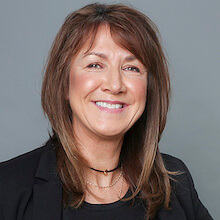
Roisin is the Founder and CEO at Marketing Mentors, they specialize in helping startups and entrepreneurs launch, grow and scale their businesses through expert marketing mentoring.
Roisin’s 2021 marketing predictions/trends:
"Video Marketing in 2021 - The global pandemic has had a big impact on how video is consumed and produced. In 2021 we are going to see video marketing trends gain more and more traction.
According to a recent HubSpot study, 54% of consumers want to see more video content from brands and businesses they support.
Additionally, these numbers show the importance of incorporating video into your digital marketing strategy in 2021:
- 70% of consumers say that they have shared a brand’s video
- 72% of businesses say that video has improved their conversion rate
- 52% of consumers say that watching product videos makes them more confident in online purchase decisions
- 65% of executives visit the marketer’s website and 39% call a vendor after viewing a video
- If your site includes video, it’s 50 times more likely to drive organic search results compared to text.
There is also a growing shift to mobile devices. It has been predicted that video will account for 70% of all mobile traffic by 2021!
In 2021, I predict video marketing will grow exponentially as part of businesses marketing mix, particularly in the following ways:
- Video posting and live broadcasting on Facebook, Instagram and LinkedIn.
- Live Video for interviews, product demos and behind-the-scenes glimpses of the brand, etc.
- 1 to 1 Video creating personalised video messages rather than phone calls or sending emails. With the decreasing cost of film equipment and increasingly high-quality smartphone cameras, this is easier than ever.
- Video SEO. YouTube and other videos are displayed in the SERPs, so video optimisation is becoming much more important – like using text overlays and closed captions, in addition to description, title and file names.
- 360-degree video content. This trend towards a more interactive experience is on the rise."
Follow Roisin on Twitter @Datatrace_com, on Linkedin Roisin Bennett and on Facebook page: @MarketingMentors.ie, group: Marketing Mentors for Startups, Entrepreneurs, Business Owners
Sarah Scott-Posey

Sarah is the Founder at Copper & Co. Marketing, helping service-driven, womxn-owned businesses build communities with social media.
Sarah’s 2021 marketing predictions & trends:
"If there is anything 2020 taught us, it's to expect the unexpected. Instagram released a myriad of features last year, including Reels, Instagram Shops, Live Badges, Live Shopping, Keyword Search and Guides. Video content, monetization, and community connection seems to be at the top of Instagram's priority list for 2021. So, what could we expect to see from Instagram?
- More creator tools and features for Reels-- possibly robust enough to rival the features of TikTok
- Additional community-building tools, such as their limited-release Messenger Rooms
- Stronger SEO capabilities via keyword effectiveness (rather than a reliance on hashtags), much like that of Pinterest
- Added monetization features for a wider range of creators: for IGTV, Stories, Feed Posts, Reels & more!"
Follow Sarah on Twitter @copperandcomktg and on Linkedin Sarah Scott-Posey
Michelle Daides

Michelle is CEO and Video Marketing Expert at MD Media Inc., she creates compelling videos that convert to sales for businesses (big brands and entrepreneurs). She’s also a strategic storyteller and award-winning filmmaker.
Michelle’s 2021 marketing predictions & trends:
"Video will continue to grow exponentially as the number one content marketing and sales tool. Since we cannot meet in person during the pandemic especially for sales calls, video has become the only form of contact and way to connect. Algorithms favour videos and help boost SEO and visibility on social media channels, so we should all be focused on creating more video content (whethere live or pre-recorded).
I also see video becoming a massive monetization product. If you haven’t hopped on the Tik Tok trend for your business, it’s time too. Businesses and entrepreneurs can capitalize on paid virtual events, seminars, workshops, meet and greets, e-courses etc.
Our video consumption rates as consumers will multiply, if you want to sell in 2021 - be inventive with your videos so your content stands out. Focus on producing creative “how-to videos”. Not only do consumers yearn to combat boredom but they also want to learn something new during the pandemic.
Follow Michelle on Twitter @MDMediaInc and on Linkedin Michelle Daides
Gosia Mitros

Gosia is a Digital Marketer at Bluestone PIM, she specialize in B2B content marketing. Their SaaS Bluestone PIM is a Product Information Management platform that serves online sellers in the B2C and B2B space who want to make engaging, quality product content their competitive advantage.
Gosia’s 2021 marketing predictions & trends:
"Our attention spans get shorter, and tolerance thresholds for manual work drop lower and lower. Channel marketers will rely increasingly on tools, workflows, and algorithms to generate content for each channel.
As the automated distribution of content between marketing channels becomes widely available, many more marketers will finally have a chance to reach a higher level of marketing — and stage immersive experiences for their customers."
Follow Gosia on Linkedin Gosia Mitros
Mike Korba

Mike is CCO & Co-Founder at User.com, which is a marketing automation platform designed for SaaS, E-commerce and Digital Businesses. It integrates all communication channels, CRM, knowledge base as well as user-friendly analytics & reporting tools in one place.
Mike's 2021 marketing predictions & trends:
"2021 in marketing will be mainly about the video. And I mean here not only short-form videos, stories or social media live streaming but also, for example, personalized videos recorded by SDRs and sent to prospects, which has been getting increasingly popular in the B2B sector. In my view, we should also keep an eye on the development of live commerce that is a video-life-selling model extremely popular in China and some other East-Asian markets.
As due to COVID-19 the possibilities of testing, touching and comparing products in brick & mortar stores are extremely limited, live commerce seems to be an interesting way of running product presentations and might gain traction in Europe and North America."
Follow Mike on Twitter @michalkorba and on Linkedin Mike Korba
Sunshine Dominguez

Sunshine is Founder and Video Content Marketer at Sunshine Digital LLC, she specializes in content marketing with video. Sunshine helps brands with long-term video content strategy, systems, and processes to better reach new and existing digital audiences.
Sunshine's 2021 marketing predictions & trends:
“For years many marketing predictions stated online video was on the rise. We are now at the point that video is here, and it is with firm confidence I can say it is here to stay.
I strongly believe TikTok is only going to continue gaining momentum from here. The app is somewhere between the early majority and late majority on the Bell Curve, and the closer brands are to becoming the laggards, the more there will be with increased competition and inevitable algorithm updates. TikTok has become popular for both its strong virality potential and unpolished content. Though the algorithm's golden era may slowly, but surely be fading (as it does for every social platform historically)–It's not at all too late for brands to join in as organic creators. Some notable brands leveraging awareness through content creation on TikTok include: @dreamracinglv, @selfdefenseonline, and @loungefitbrand just to name a few.
With the pandemic forcing many brands to cut budgets thus bring more content efforts in-house, gathering restrictions likely remaining in the foreseeable future, on top of "real", non-overproduced content becoming the preferred standard––there should be a definite increase in video content across platforms. And not just as a marketing or branding tactics, but as a means of raw communication & connection.
And that's not something that will go away, even if 2021 does bring glad tidings of "normalcy" once again.”
Follow Sunshine on Linkedin Sunshine Dominguez, on Instagram @sunshinedgtl, and on TikTok @sunshinedigital
Annie Price

Annie is the Founder and Content Creator at Custom Copy and Content, they provide content creation, vlogging, blogging, social media management, website building and even voiceovers.
Annie’s 2021 marketing predictions & trends:
“The continual rise of the hashtag and evolution of newer, interactive and visual social media. We've already seen a huge spike in TikTok users of all ages.
I also think that, due to the current pandemic, more and more businesses will be forced to develop their online presence - meaning more social media profiles, more active websites with comment sections and blogs and more PPC campaigns.”
Follow Annie on Twitter @aejprice and on Linkedin Annie Price
Ray Mongey

Ray is the founder and CEO at Octovid, Intelligent Video Marketing.
Ray's 2021 marketing predictions & trends:
2021 will be the year of personalized video marketing
Personalized video marketing will be one of the biggest marketing trends in 2021 because it will be the most effective. The power of personalized video marketing lies in its ability to build rapport with customers through the use of data. When you think about it, personalized videos are the best combination of video and digital marketing. Marketers will be able to get their message out there in a way that will be more effective than ever.
Companies like Octovid are the forefront of this movement, allowing you to create individualized videos that are tailored to your specific business and audience. This is a huge game changer for marketers everywhere. Individual messages and uniquely tailored video content is not only a new way to communicate with customers but will be essential in 2021 to grab attention in the ever increasing content landscape. We predict that in 2021 almost all marketing messages would be personal and meaningful. These messages will come via email, text, social media and video.
Follow Ray on Linkedin Ray Mongey
Customer Experience
Cody Ward

Cody is Sr. Director of Demand Generation at Conexiom. Cody focuses on generating pipeline and accelerating revenue for VC and PE backed hypergrowth SaaS companies via marketing. His sweet spot is companies in the intersection of B2B, SaaS, $20MM to $200MM ARR, 40%+ YoY growth, VC/PE backed, acquisition heavy and expanding globally. Cody works with these organizations to design and build scalable, effective and predictable growth engines and teams by focusing holistically on the people, strategy, tactics, process, technology and data.
Cody's 2021 marketing predictions & trends:
In 2021, we'll see a greater focus on improving the B2B customer experience. Marketing will lead the way with specific programs focused on retention, up-sell and cross-sell at a pace we've not seen before. New campaigns will focus on 1-to-1 white-glove campaigns for top enterprise customers and 1-to-few personalized scalable experiences for target accounts. Additionally, companies across all industries will focus on integrating their business development and sales functions to work in tandem with their marketing teams.
These revenue engines will start to form and replicate the types of experiences that people are used to in the B2B world. Silos will come down and martech and salestech will be evaluated as revtech, as it matures into a customer-centric strategy. These teams will not only look at the top-of-funnel but they'll digitize and automate all business processes that can be automated. All digital transformations that started in 2020 due to COVID-19 will only gain momentum as businesses further adapt their services to maximize their customers.
Follow Cody on Twitter @CodyMWard and on Linkedin Cody Ward
Michelle R. Burrows

Michelle is CMO at Procare Solutions. Michelle has been a SaaS-based marketing exec for her entire career. Procare Software sells to the child care industry – child care centers, before and after school programs, along with enrichment classes.
Michelle’s 2021 marketing predictions & trends:
Years ago, marketing transformed their relationship with Sales and we aligned our metrics around “one view of the truth” with a focus on contribution to pipeline, net-new logo creation and marketing-driven and/or influenced sales.
During 2020, we all had to shift and pivot to enhance and improve customer experience, particularly with fewer net-new opportunities. My prediction is that the relationship with Customer Experience continues to evolve and metrics such as NPS and retention increase in importance not only in Marketing, but across the organization.
Follow Michelle on Twitter @BurrowsMichelle and on Linkedin Michelle Burrows
Jessi Romero

Jessi is Founder & Marketing Coach at ADHD Female Entrepreneurs, it’s an online community for ADHD womxn business owners to get relatable support, accountability, and effective business advice for our uniquely structured brains.
Jessi's 2021 marketing prediction & trends:
“Faster, shorter, and more genuine.”
“Today, social media users expect to be taught in a 60 second TikTok video versus what once was an 18 minute YouTube tutorial. Viral content today, is delivered in a way that is easy to absorb and quick to attract and get to the point.
To stop the scroll and users' attention, marketers will need to make it fast, short, and genuine. In a time of restricted social outings, and the decline of social human interactions- people are filling the void to connect with other humans, by relating with online strangers who are sharing their unfiltered, raw, and relatable moments.
My prediction is that 2021 trends will have to continue to feed the need for online human connection by making marketing material more authentic, genuine, and “realistic” to keep users engaged and interested.”
Follow Jessi on Linkedin Jessica Romero and on Instagram @adhdfemaleentrepreneurs
Cay Gliebe
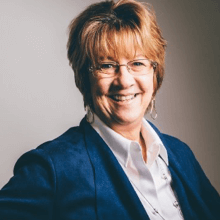
Cay is SVP of Marketing at One Source Virtual, which is a Workday partner that has helped more than 1,300 companies with everything from deployment to maintenance to payroll and more.
Cay's 2021 marketing predictions & trends
2021 is the year marketing leaders will quickly adopt and leverage technology solutions that produce actionable insight into market intent, quality of content, and brand position. Understanding the buyer and aligning relevant and robust value messaging will be critical to ensure early awareness and engagement of the ideal customer profile within a company’s target account market.
Marketing must demonstrate we can do more than influence sales wins – we must generate a significant portion of the sales opportunities so the sales team can focus on what they do best – win deals.
Equally important is the need to build an engaged customer community. We are ideally positioned with skilled resources to help the organization retain one of our most valuable assets – the existing customer. Customers want more from the companies they’re doing business with, especially when the company is providing outsourced services.
Follow Cay on Twitter @CayGliebe1 and on Linkedin Cay Gliebe
Natascha Lee

Natascha is Director of Global Partner Marketing at TIBCO. TIBCO fuels the modern enterprise through TIBCO Connected Intelligence
Natascha’s 2021 marketing predictions & trends:
“In channel/partner marketing, we will see more and more partner types involved in and influencing the customer journey. Complexity and opportunity will grow.
This will include multiple partners involved in everything from partner sourced & delivered business at one end, to co-selling, to partner influenced at the other end.
Customer satisfaction will remain measurement #1, and vendors and partners will leverage new options in the martech stack to align on key metrics around customer satisfaction.
Gone are the days of a single-technology based partner portal.
As the channel marketing tech stack grows exponentially, we will see providers who function as System Integrators, specifically for vendors who have robust and complex partner ecosystems and need to integrate multiple systems such as partner portal, deal registration, learning and certification, marketing platforms, asset management, etc.”
Follow Natascha on Linkedin Natascha Lee
Gowri Krishnan

Gowri is Head of Content at Eber. Eber help companies grow their revenue through customer loyalty.
Gowri’s 2021 marketing predictions & trends:
"More companies will invest in powerful CRMs to understand and engage with their customers. The days of hard selling are over. In 2021, you have to focus on building a relationship with customers. Every business owner should have a tool to collect customer's data. Even customers now understand the importance of giving their information to businesses - and they're open to it so long as it benefits them.
They want to see personalized product recommendations and relevant ads. They want their favorite stores to know their birthdays and reward them accordingly. They want to be greeted by their first name. They want to be rewarded for being a loyal customer. In 2021, if you don't have a tool to get to know, understand, recognize and reward your loyal customers - your customers will leave you for someone who does."
Follow Gowri on Linkedin Gowri Krishnan
Business Transformation
Sarah Fink

Sarah is VP of Marketing at Vector Remote Care, they specialize in cardiac digital health working directly with cardiology practices and hospitals to help improve the lives of their patients through remote patient monitoring solutions.
Sarah’s 2021 marketing predictions & trends:
- Sales & Marketing are going to have to actually start working together: This is always going to be a hot topic but sales teams are going to be more reliant than ever of leveraging and engaging in digital marketing and inbound marketing strategies to build a pipeline. In order to do this, it's not enough to give marketing a number, these teams need to actually start working together to optimize the sales funnel and win. I predict that the companies that really pull through and adapt to the changing business environment will be those sales and marketing teams that figure out how to break down silos and work together.
- Digital, Digital, Digital: Marketing teams will need to double down not just on digital marketing budgets but on talent. Digital strategy and marketing has been a discipline that many B2B businesses have luke warmly embraced and for the most part outsourced. I see marketing departments spending more and investing in in-house talent to stay competitive, have more subject matter expertise, and be more nimble than having agencies manage this work.
- Direct Marketing makes a comeback: I think there is going to be a resurgence in direct marketing, i.e. through mail. Whether its promo items or other strategies to attract attention and stand out, direct marketing is a lost art that makes sense to have a comeback with limited in person relationship building and so much happening on screens. Getting a letter or a package from a company that wants to earn your business makes the prospect feel special and easily pull them back into a digital experience. B2C has been doing this for sometime, it's time for B2B to figure this out.
Follow Sarah on Twitter @SarahLaufer and on Linkedin Sarah (Laufer) Fink
David Berkowitz

David is the Founder at Serial Marketers, he works with tech startups and agencies to optimize demand generation, and he welcomes marketers of all stripes to the global community that he runs.
David’s 2021 marketing predictions & trends:
“2021 is going to be a year where marketers try to do much more with much fewer resources. Most sectors of the economy will rebound, but not necessarily to pre-pandemic levels. Budgets for higher-ticket marketing services and any marketing expenditure that remotely felt like a luxury were decimated last year, and those will take time to recover. There's a lot of pressure to grow though and to capitalize on the economy's increasing strength especially when most American adults have access to a Covid vaccine in Q2.
Marketers are going to increasingly buy on value; more expensive options will have to work harder at proving themselves, while they will prioritize various ways to outsource staff and increase the power of their tech stacks.
They will also be driven more toward B2B communities and other avenues where they can efficiently get recommendations and build back their professional networks. Communities will fill some of the gap between live events that are slow to return and the fatigue of virtual events.”
Follow David on Twitter @dberkowitz and on Linkedin David Berkowitz
Karen Amundson

Karen is Founder and CEO at Apiary Digital, they specialize in Performance marketing (SEM, SEO, paid social, analytics) for high growth DTC ecommerce and B2B SaaS brands.
Karen’s 2021 marketing predictions & trends:
Inclusive marketing - Between the recent growth in awareness of racial equity issues and the fact that 48% of gen Z come from communities of color, brands will increase investments in inclusive marketing. Consumers of all backgrounds are paying attention to what actions brands are taking to be more inclusive when deciding how to spend their dollars. This will not just impact consumer-facing marketing, but also B2B marketing. As more brands prioritize DE&I beyond a lip service PR move, the composition of B2B buyers and decision makers will change. Those not paying attention to this trend are likely missing out on market share! For those looking to gain education on the topic, I recommend Sonia Thompson's Inclusive Marketing Academy.
Remote-first - Technically, this has already happened. But the practice of remote life, commerce, school, and work will mature. In the first phases of the pandemic, individuals and companies had to reactively figure out how to operate in a remote environment. This meant trying to remotely replicate in-person things, but in an inferior way. Looking forward, we'll see people and companies figure out how to rethink life and business from the ground up, designing things around the unique benefits of a remote environment. For marketers, this means both adapting the way we work and structuring our teams and companies—and adapting the way we connect with and market to customers. With more than 5 years of experience as a location-independent business, Apiary Digital shares thought leadership on the topic from our ebook: Overhauling Business For The Remote Era.
Things to watch - With the rollout of GDPR in Europe, CCPA in California, and upcoming changes to tracking within iOS14, the way we track and target customers needs to evolve. Certainly, we'll see a push toward increased regulation of social media platforms with the various lawsuits and pleas for censorship that have cropped up in the past year. My hope is that we develop a system that serves all the stakeholders: Customers, brands, and advertising platforms. Along those lines, Brave is a browser that uses blockchain to give consumers a piece of the action to share in some of the revenue that comes from monetizing their attention. While I don't expect Brave to take off—at least not in 2021—it will be interesting to see how blockchain begins to influence the marketing and media landscape over time. Semi-related is the fact that some folks are recognizing that technology is not a neutral force, but that the biases of those building technologies find their way into the algorithms and AI that are so central to our lives. While not at all new, there is increased awareness on equity in tech, as showcased by Safiya Noble, PhD in her book Algorithms of Oppression.
Follow Karen on Twitter @KarenGAmundson and on Linkedin Karen Amundson
Adam Gelles

Adam is the Founder at The B2B Marketing Company where he helps high-growth, mid-market, and enterprise companies grow.
Adam’s 2021 marketing predictions & trends:
There is a new sheriff in town and it's called: people. B2B Marketers will need to adjust their thinking from MQLs, SQLs, LMNOPQLs to consumer and customer experience.
We’ve seen the backlash on LinkedIn as automated intros in the message queue go unanswered and the robot follows get eliminated to the halls of inhumanity of marketing automation.
That’s the (r)evolution - The transformation of B2B marketing from drip-campaigns and tech stacks to well orchestrated human interactions. Sure those interactions are still aided by technology and the insights tech brings, but Skynet must be subservient to humans.
So what does that mean for us B2B marketers. It means we must become empaths for our various constituencies to deliver an elevated experience that drives business.
Follow Adam Gelles on Twitter @adamgelles and on Linkedin Adam Gelles
Meike Eilert

Meike is Marketing Educator and Researcher at University of Kentucky, she specializes in research on corporate social responsibility, activism, and sustainability.
Meike’s 2021 marketing predictions & trends:
“One trend that has already started in 2020 but I think we will see more of is how physical consumption spaces are changing to make them more safe for both customers and employees. Stores will be more intentional about traffic flow patterns and redesign layouts so that customers are less likely to congregate or wait in tight spaces. Pick-up/take-out windows for restaurants without the ability to have drive thus will become more popular, and we will see more “ghost kitchens” without physical spaces or new restaurants in locations with drive-thru capability.
Regarding social responsibility and activism efforts of businesses, we will see more emphasis on authenticity since quite a few brands received a lot of criticism in how they engaged with the Black Lives Matter movement in 2020. To avoid backlash about “woke-washing,” we will likely see more well-thought out activities in this area, such as a focus on authentic representations of diversity in marketing programs.”
Follow Meike Eilert on Twitter @meike_eilert and on Linkedin Meike Eilert
Hana Jacover

Hana is Director of Demand Generation at MadKudu. MadKudu is a predictive marketing intelligence platform for B2B revenue marketers.
Hana’s 2021 marketing predictions & trends:
"Marketers are still frustrated with the amount of disparate data that results in operational challenges and roadblocks. We will see a shift in interest and intent to purchase technologies that are working to solve this problem specifically. Marketers will be more curious than ever about extracting, organizing and enhancing existing data to then better align with the needs of the marketplace and the buyers they serve. This will allow marketers to focus on intelligently creating and delivering more relevant, hyper-segmented content and campaigns. Not to mention, it will allow marketers to also focus on the creativity needed for campaigns to truly stand out in a world where buyers are desperate for something different and unique.
In 2021, we'll see a more obvious generational shift among marketing decision-makers, and with this, a broader expectation of leadership and brand authenticity and accountability. I believe we will see decision-makers favorably evaluate partnerships/technologies that have taken a public position on issues like racial injustice, climate crisis, data privacy, and political unrest; issues that may have traditionally been seen as "taboo" in the B2B space. Early B2B CMO studies show that 2020 brought an observance of "Greater acknowledgment of companies’ attempts to do “good.” Brands that have taken a stance on these kinds of issues will continue to earn a higher level of trust and interest from buyers, especially younger decision-makers."
Follow Hana on Twitter @hanajacover and on Linkedin Hana Jacover
Jill Kane

Jill is a Wellness Business Strategist, she helps Health Coaches and wellness business owners build, brand, and launch a highly profitable signature group program.
Jill’s 2021 marketing predictions & trends:
"I think we will continue to see a high demand for products and services that support the home environment, especially as remote work continues to expand, and we are spending so much time in the home.
Also, people are craving connection as well as mental health support. Tools, technology, and coaching programs that offer this type of support will be popular. Although digital marketing is here to stay, I think we will see a big surge of people investing in programs and services that have emphasized the human to human element in more intimate settings."
Follow Jill on LinkedIn Jill Kane and on Instagram @jillkanewellness
Meghan Lynch

Meghan is the CEO of Six-Point Creative. She specializes in brand and marketing strategy for second-stage companies.
Meghan’s 2021 marketing predictions & trends:
"The content wars will rage. Continued competition for the attention and engagement of virtual audiences will flood digital platforms with content. The winners will be niche challenger brands who are laser-focused on a target audience that they know extremely well. Anyone dabbling in content, or trying to speak to a broad audience without a huge budget will be ineffective at cutting through the noise.
Brands that pre-COVID were dependent on retail or in-person marketing will need to figure out how to build compelling experiences online to promote trial and connect with users. We will continue to see more small brands collaborating to cross-promote and reach new customers. For CPG brands, expect to see more giveaways, product bundles, and collaborations with influencers, especially influencers who can sell products directly to their audiences as online retailers.
Companies, especially mid-sized companies with strong opportunities but limited resources, will be dependent on research, data, and specialized expertise in order to reach new markets. Winners will invest in upfront insight to move quickly and efficiently. Companies that struggle in the "new normal" will spend too much time in trial and error and lose valuable market share in the meantime."
Follow Meghan on Twitter @meghanlynch and on Linkedin Meghan Lynch
Arpine Babloyan

Arpine is Sr Director of Demand Generation and Marketing Ops Fuze, they are a global cloud communications provider for the enterprise. Their intuitive unified communications and contact center platform enables seamless transition between calling, meeting, chatting and sharing.
Arpine's 2021 marketing predictions & trends:
“If 2020 was the year of the “new normal”, 2021 would be the year of “back to normal”, or maybe “new normal 2.1”. We are now looking forward, and while there’s still a level of uncertainty, there is also hope. What we already know is that “normal” won’t be the same as it was before, and companies today are starting to think about what this “comeback” will look like - some sort of a hybrid between old and new. 2021 will be a year of reflection, a time to look back on the lessons of the previous year and see what we’ve learned. For marketers (B2B and B2C alike), there is an opportunity to help with this transition.
As soon as it becomes a possibility, live events and experiences are going to have a strong comeback. People who missed face-to-face interaction and networking will be willing to attend more to compensate for the lost time. We’ll see a lot of lunch-and-learns, experiential marketing, live workshops, and partnerships with sports and concert venues to get people out.
Another marketing trend of 2021 will focus on personalization in B2B. The pandemic blurred lines between life and work, and what used to be a coffee break may have become a “loading the dishwasher” or “getting laundry” break. 9-5 is now “whenever I can”, which means employees use their personal devices and research work projects while logged into personal accounts more and more often. Because of it, account-based targeting by IP is now less reliable, and advertising on traditionally B2B channels (especially social media), will gain more power. More so, it will become more important to recognize prospect’s personal needs in addition to their business needs, and incorporate that into messaging and targeting.
Last but not least, another marketing trend for 2021 will be inclusivity. Last year highlighted the importance of diversity and inclusion, and this year marketers will put more emphasis into supporting it. This may include broad initiatives like updating corporate mission statements, imagery, and messaging, as well as focused efforts on accessibility in digital, and thought leadership focused on empowerment and inclusivity.”
Follow Arpine on Twitter @Arpine and on Linkedin Arpine Babloyan
Erik Huberman

"Erik is the Founder & CEO at Hawke Media, they specialize in custom, data-driven, performance-focused solutions to help launch, scale, and invigorate businesses of all sizes, industries, and revenue models. Acting as a full-service outsourced CMO, Hawke offers a wide array of digital marketing services on a month-to-month, a la carte basis.
Erik’s 2021 marketing predictions & trends:
“We’ve seen a massive increase in the percentage of consumer spending online versus brick and mortar, and I think that online spending is here to stay. I believe that we’re going to see over 25% of consumer spending done online in 2021, which will get the attention of bigger brands and companies that will see people’s attention shift online. Because of CPG companies coming in and doubling down online we’re going to see advertising costs increase a lot.
Because advertising costs will bump up, the cost to acquire will shoot up. In order for companies to succeed this year, they’ll really have to increase the lifetime value of their customers.
Brands will employ marketing strategies that will build out their lifetime values so I think we’re going to see a lot more branded content come out and focus on lifecycle marketing, especially email and SMS, as well as better merchandising, etc.
I think that the big chunk of companies that rely on just Facebook ads to build their businesses are really going to struggle in this new marketing landscape.”
Follow Erik on Twitter @ErikHuberman, on Linkedin Erik Huberman and on Instagram @erikhuberman
Michelle Ngome

Michelle is Inclusive Marketing Consultant at Line 25 Consulting, she specializes in diversity and inclusion from a marketing perspective. As well as strategic marketing plans.
Michelle’s 2021 marketing predictions & trends:
"Over the past several months there has been heightened awareness about diversity and inclusion. The concept of D&I will migrate from human resources to marketing initiatives.
Before the pandemic brands could target audiences through events but will need to adopt other marketing mediums to connect with consumers.
Organizations are learning to select diverse images and becoming inclusive in their messaging. This is particularly important on career pages that display the company's culture. Consumers are becoming more aware of how brands market and advertise to audiences. If they feel seen and heard they will support the brand."
Follow Michelle on Twitter @MichelleNgome, on Linkedin Michelle Ngome, on Instagram @michellengome and on Facebook @michellengome
Whitney Hausmann

Whitney is Senior Vice President of Marketing at Within3, which is a virtual engagement platform for the life science industry. Enabling secure, compliant conversations among thousands of stakeholders spread across multiple time zones and languages.
Whitney’s 2021 marketing predictions & trends:
"Marketing strategies will be intentionally virtual. A colleague of mine recently spoke about how our clients are going to be intentionally virtual in 2021 in regard to the way they engage their stakeholders with our platform.
In 2020 people were thrust into the 100% virtual world without having time to think about it, scrambling to find solutions to do their jobs. By 2021, we’ve had time to figure out how to maximize our effectiveness virtually.
The same thing applies to marketing. While digital marketing has always been a big line item on marketing budgets, in the absence of live meetings we’ve had to figure out how to generate the same quantity and quality of leads to feed to our hungry sales team.
In 2021 as marketing leaders develop their strategies they will be intentionally virtual, using virtual methods of engagement to supplement their digital marketing efforts. We have learned to reach our customers without live meetings and while we will be ready to attend them when they return they will supplement our virtual strategy verses being the primary driver of how we engage our customers."
Follow Whitney on Twitter @WhitHausmann and on Linkedin Whitney (Brostrom) Hausmann
Caroline Hess

Caroline is the Founder and CEO at True Blue Creatives, they work with women-owned small businesses to help them develop their brand and establish an online presence.
Caroline’s 2021 marketing predictions & trends:
In 2021, we're going to see people prioritizing social responsibility in their purchasing decisions. People are going to care less about the convenience of two-day shipping and more about a business' stances on major social issues.
During the height of the Black Lives Matter movement in 2020, we saw large corporations being called out and held responsible for their lack of diversity among leadership. Billion dollar companies were being held accountable and forced to make a positive change in the name of social justice. I believe that we're going to see a continuation of this in 2021.
People are beginning to realize that their dollar is their vote and will choose to spend their money with businesses that hold the same values they do. In the world of marketing, this means making your business' values very clear to its customers — whether it be about racial equality, gender equality, sustainability, etc. If there is a large protest happening in support of a social issue your business supports, be sure to post about it on social media that day rather than promoting your latest sale.
Follow Caroline on Linkedin Caroline Hess
Gerardo Contreras Vacca

Gerardo is Co-founder & CMO at Remote Social, he’s an entrepreneur and a B2B marketing leader with experience in creating go-to-market strategies for large technology and SaaS organizations.
Gerardo’s 2021 marketing predictions & trends:
"Technology will continue to level the field for businesses - Now more than ever, small and medium businesses are feeling the pressure to 'go digital'. Those businesses who were lagging and had digital transformation in the bottom drawer of their filing cabinet, had arguably the hardest time in 2020 as they rushed to digitize and build an online presence. The good news - those who survived, are now very aware of the benefits of digital, and investment in new technologies will continue to grow as it becomes more accessible.
Flexible work is here to stay - In 2020 we saw the trend of remote work accelerate to the point where organizations are now rethinking the way they operate and are moving towards adopting a hybrid model. Although this brings benefits and more flexibility to both companies and employees, it also comes with its challenges. Employee engagement and culture are at risk. Organizations will now have to put more thought into how to provide more meaningful ways to build and sustain company culture, which as we know is fundamental to employee engagement and retention strategies."
Follow Gerardo on Twitter @gacontrerasv and on Linkedin Gerardo Contreras Vacca
Simon Bronders

Simon is the Founder at AdSomojo, they specialize in word-of-mouth marketing and contagious marketing strategies that help businesses beyond making a profit.
Simon’s 2021 marketing predictions & trends:
"The marketing winners in 2021 will nail three things:
1) Being remarkable
2) Leveraging word of mouth
3) Actively repel customers that are no match for your company
I imagine marketing to evolve as a force for good. Customers are relentless and unwavering in keeping brands accountable. People are tired of being sold to, and brands should steer away from sales as the most worthwhile goal. Start looking at sales as a means to make your company contribute to people's lives, never the destination itself.
Getting your target group intertwined with your brand values through engagement, feedback and taking a stance on critical social issues makes them feel understood and valued. One size fits all never fits anyone great.
One sentence to keep in mind when drawing the blueprint of your new marketing blueprint for 2021? "Artificial flowers might look pretty, but they'll never feel or smell as good as the real ones."
Follow Simon on Twitter @SimonBronders and on Linkedin Simon Bronders
Mia Naumoska

Mia is a Co-founder at Reshaped - a digital marketing agency with a mission to enhance brands while creating better connections with their consumers. Having over a decade of experience in the marketing field, Mia is responsible for Reshaped’s online presence strategy, managing an amazing team of marketing experts, and getting things done to help other businesses improve their online presence.
Mia’s 2021 marketing predictions & trends:
In 2020 we have witnessed that many people started to pay attention to their privacy online. People want assurances that their identity and information are safe as they browse the web.
2021 will be the year of privacy laws, especially in the US. However, we live in a globalized world and no country will be excluded.
This will help the digital advertising industry to build a more transparent and reliable ecosystem. Having this in mind, many companies will look for new ways to access the necessary information that will allow them to run user attraction campaigns.
Follow Mia on Linkedin Mia Naumoska
Heather Van Dyne

Heather does Marketing Strategy and Public Relations at her own practice Heather Van Dyne - Marketing Strategy, she specializes in helping to develop and implement creative marketing strategy for small and mid-size businesses.
Heather’s 2021 marketing predictions & trends:
"2021 will see a rise in consumers embracing online transaction processes in larger-scale arenas, such as vehicle sales and leasing, real estate sales and purchases, and health and wellness products and services.
The pivoting that many businesses did in 2020 that drove exponential growth in small-scale transactions, such as grocery orders and delivery and errand services like DoorDash and Grubhub have built familiarity and trust in online sales processes that may not have already existed with some customer segments. This confidence will embolden consumers to embrace technology, such as automotive digital retailing to buy their next vehicle, where they may have been hesitant before. Businesses will need to be conscious of their customer's growing comfort with online transactions and build their business processes accordingly to support them as strongly as they would with in-store transactions."
Follow Heather on Twitter @HMVanDyne and on Linkedin Heather Van Dyne
Amanda Hiebert

Amanda is a Content and Demand Generation Professional
Amanda’s 2021 marketing predictions & trends:
"Considering the fact that the United Nations has named 2021 the International Year of Creative Economy for Sustainable Development, it will be a defining one for brands. As 2020 brought multiple waves of crisis across the globe, from economic, to health, and social justice, brands have been pushed to respond to how customers engage, and in turn, reimagine how they show up and exist in the market.
While this is certainly an opportunity to elevate purpose, the coming year will likely call on companies to move forward with greater transparency, community accountability and unbridled authenticity. In this incredible cultural shift, customers are empowered more than ever by their spend. Rather than being easily swayed by traditional shiny marketing techniques, consumers on the whole, will now be looking to see a purposeful, positive contribution to the world at large in exchange for brand loyalty."
Follow Amanda on Twitter @amandahiebert and on Linkedin Amanda Hiebert
Content, Search Engine Optimization, Ads and Attribution
Umair Mansha

Umair is an SEO professional at ILoveSEO.
Umair’s 2021 marketing predictions & trends:
"2021 will be both scary and exciting for every marketing professional out there. AI is developing at a crazy pace and I have tried some of its applications such as GPT-3 and I can say confidently that it'll be a total game-changer for content marketing and copywriting in 2021 and beyond. I have used software tools such as broca.ai and conversion.ai that are built on top of GPT-3 and their content outputs are as good if not more than professional copywriter (human being).
Content writing as a job is totally changing now and AI so good that you cannot tell a difference between an article written by an AI or an actual human being. If you don't believe me, read this article and decide for yourself.
Follow Umair on Twitter @engrumairmansha and on Linkedin Umair Mansha
Erica Hakonson

Erica is Principal and Founder at Maven Collective Marketing, they specialize in B2B digital marketing, including SEO, SEM, Marketing Automation, Email Marketing, Event Marketing, Virtual Events, Social Media Marketing, Content Marketing and Digital Performance Website Audits. They partner with B2B software/software service organizations, as large as Microsoft to as small as tech start-ups, to produce award-winning marketing with measurable marketing expertise.
Erica’s 2021 marketing predictions & trends:
The predictions for marketing in 2021 aren’t that different from 2020, but the fatigue in the market is going to be ever-present. You will need to stay on message, be consistent and deliver high-value material to be heard through the fog, noise, and restlessness. You need to be on point, marketing through the right channels to your target audience consistently with quality content that delivers value with each interaction.
In 2021, there are more and more opportunities to explore what/how you are displaying in the SERPs (search engine results pages) in which you should allocate time toward. With new features being added to Google Search Console each month, and most recently Microsoft Clarity, there are more and more opportunities to use schema markup and rich snippets. You’ll enable yourself to compete for position zero, without spending a fortune to be there.
And like every year, we at Maven Collective Marketing highly recommend auditing your existing website, social, backlink, email, advertising and event performance to understand and benchmark how you are moving the needle and what demands your immediate attention for improvements.
Follow Erica on Twitter @CollectiveMaven & @EricaHakonson, Instagram @MavenCollectiveMarketing, and Facebook @MavenCollectiveMarketing
Julie Quintard

Julie is a Marketing Manager at OnCrawl. OnCrawl is a technical SEO and Data platform for enterprise SEO audits and daily monitoring targeting, used by SEO and e-commerce professionals, technical SEOs and data Scientists. The solution helps more than a thousand clients in 66 countries to improve their organic traffic, rankings, and revenues by opening Google’s black box.
Julie’s 2021 marketing predictions & trends:
“I have two main marketing predictions for 2021, these areas performed well during the COVID-19 crisis and provided concrete solutions for marketers:
SEO Predictions - SEO is a great source of traffic and revenue for many companies that have an online business. Over the years, many talented professionals have evolved this field into a discipline at the crossroads of science, coding, content and UX. I believe that 2021 will mark a new turning point in the industry with the growing use of data science to predict, automate and plan SEO strategy. These new features will allow us to go even further in analyzing data and implementing the right SEO optimizations at the right time. Larger companies have already started to develop customized tools and more and more SEO freelancers and smaller companies are also building their own tools using technologies such as Python and R which are getting more accessible and templates pre-defined by platforms or influencers. The year 2021 is shaping up to be the year of Data SEO!
Virtual Events - Virtual events have become indispensable since the beginning of the COVID crisis and I believe that they still have a bright future ahead of them in 2021. Not only because the health context does not allow for face-to-face events, but also because they have proven their practicality and quality. With new platforms dedicated to virtual events, we were able to attend great conferences, interacting with speakers and professionals from all over the world. Being able to attend a qualitative event and learn new methods from your living room is a comfort that was not possible a few months ago. I think this format has seduced many professionals, and even if trade shows are still a must-attend event, we now have another alternative with the advent of online events."
Follow Julie Quintard on Twitter @JulieQuintard and on Linkedin Julie Quintard
Maia Morgan Wells

Maia is Marketing Director at Clearpivot. ClearPivot is a full-service digital agency specializing in website development and marketing automation for the SaaS industry. Maia’s personal specialization is in content planning for ultimate SEO benefit.
Maia’s 2021 marketing predictions & trends:
"2021 is going to bring a huge craving for connection and community. As marketers, we have an important opportunity to contribute to the lives of the customers we interact with through the content and programs we create.
Companies like Ahrefs have user communities on Facebook, for example to help people connect, and share ideas, problems, solutions and even a few laughs. We'll continue to see SaaS companies, consumer brands, media companies and other businesses offer virtual events, online communities and social media challenges. And, we'll see these ways of connecting and facilitating community become more and more creative. One company on the forefront is the Complex media company, with its Complexland virtual experience. I can see SaaS marketers taking inspiration from events like this, and continuing to reach out to connect with users, and help provide the sense of connection so many will be seeking this year. "
Follow Maia on Linkedin Maia Morgan Wells
Lana Volkov

Lana is SEO & Content Strategy Consultant at SERP Wolf, she specializes in SEO and content strategy for startups and small businesses. She has 6+ years of experience performing on-page, off-page, and technical SEO audits, in addition to content management and content planning for businesses.
Lana’s 2021 marketing predictions & trends:
"Content creation will be more focused on user intent and user's customer journey. Google is working hard on personalizing search results, which means that blog posts and other content pieces will have to target specific audiences to increase the possibility of organically ranking in search results.
In addition, it is worth optimizing your content for Google's featured snippets. Some queries display Google's featured questions like "People also ask", and if you answer these questions in your blog posts or pillar pages, you might surpass your competitors and be featured in the featured snippets instead of your competitors."
Follow Lana on Linkedin Svetlana Volkov
Emily Dalamangas

Emily is Founder at On The Map Marketing LLC. Emily is a marketing consultant specializing in copywriting and content creation for small to medium sized businesses, media companies, digital agencies, and nonprofit organizations.
Emily’s 2021 marketing predictions & trends:
“I predict that we will continue to see a rise in solution-based content that educates and informs. With the stay-at-home trend there is an ongoing demand for information about activities that will keep consumers busy and entertained. This will especially be around the topics of home-based hobbies and DIY home improvement where consumers are seeking quality, expert driven content. There will be snackable content to peruse on blogs and social with the option to do a deeper dive via downloadable guides and instructional videos.
We will see brands leverage their authority with engaging solution-based content in order to build their communities of like-minded individuals as people are looking to connect more than ever. There will be a strong emphasis on personalization of content by brands to build loyalty and affinity among their competition. Brands hope that those at-home activities will have taken root and as we slowly return to a post pandemic world that reliability on their content will continue to grow.”
Follow Emily on Linkedin Emily Dalamangas
Hans van Gent

Hans is Founder and Chief Strategist at User Growth.io. They help SMEs and startups grow through organic and paid traffic channels in order to maximize the number of sales and leads clients generate. They do this through increasing website traffic, improving conversion rates and implementing the latest marketing strategies to grow revenue.
Hans’ 2021 marketing predictions & trends:
"2020 was a year that hit hard for a lot of businesses worldwide. As a result, budgets have been tightened. I think 2021 will see a decrease in content for the sake of releasing content.
Companies will start to produce less but more valuable content. Content that delivers and can be repurposed to different platforms to increase distribution and optimize results.
On top of that, agencies and marketing departments need to start working on effective attribution models if they want to prove the value of their marketing efforts because if they don’t then more budgets will be cut.
I think 2021 will be the professionalisation of content marketing as a result.”
Follow Hans on Twitter @jcvangent and on Linkedin Hans van Gent
Paul Stephenson

Paul is Founder & CEO at 47 Insights, they help SaaS companies grow using advertising, SEO, content marketing and conversion rate optimization.
Paul’s 2021 marketing predictions & trends:
“In 2021 there will be continued decline of Facebook as an ad channel for B2B businesses due to a combination of reduced advertiser trust and increasing ad costs. In addition, the ad buyers' backlash against Google will also grow as advertisers become increasingly uncomfortable with the 'black box' nature of enforced smart bidding and Google's other various machine learning and AI 'innovations'.
Software companies will increasingly rely on sites like Capterra and G2 to bring them leads while also investing more heavily in content strategies and SEO. Microsoft will be a net winner due to increased advertiser spending on both LinkedIn and the Microsoft Advertising network (formerly Bing). Finally, I wouldn't be surprised if Apple made an offer for the DuckDuckGo search engine.”
Follow Paul on Twitter @Paul47Insights and on Linkedin Paul Stephenson
Wilfred Otieno

Wilfred is Head of Digital at Content Clerks, a digital marketing agency focusing on Social Media, PPC, SEO, and Content Marketing. They help small and medium businesses grow brand presence, generate more leads, and get more sales online.
Wilfred’s 2021 marketing predictions/trends:
"I believe SEO will become more user-focused than it is right now. Gone are the days when you would just write a piece of content, build backlinks, and automatically rank. Google and other search engines want to give their users the best possible experience when they perform a search. With Google saying that Core Web Vitals will become part of its “page experience’ score and ultimately an important ranking factor, website owners and SEOs will need to change their approach to one that is more user-focused.
Page speed will be extremely important. Website owners need to make sure their site is optimized and loads fast. A common practice especially for websites running on WordPress is to use a lightweight theme. It is also a good idea to load not only static images and files but also non-static files from CDNs. Overall, in 2021, everyone looking to rank online should aim to create relevant content and to make the user experience even better. "
Follow Wilfred on Twitter @otienowilfred and on Linkedin Wilfred Otieno
Rebecca Todd

Rebecca is Owner and SEO Specialist at Honeypot Marketing, she does content writing for SEO.
Rebecca’s 2021 marketing predictions & trends:
"Over the last few years, we have seen an increasing focus on user behaviour and search intent from Google. In 2021, I think this will become more and more important.
At the end of the day, Google is a business and it wants to cater to its customers otherwise they would go elsewhere. So every algorithm update Google makes is designed to provide more relevant results to its users. And to provide relevant results, Google needs to become better at understanding every nuance in a searcher's query. That means understanding subtle differences between searches like 'wedding band' for example. Is the searcher here looking for a wedding ring or a musical band?
I think Google's focus on user behaviour will also lead to more SERPs (Search Engine Results Pages) changes in 2021. It feels like there will be more functionality changes as Google experiments with how the SERPs look and what works for what kind of search. My advice is to keep an eye on your SERPs and a finger on the pulse in the SEO community, especially on Twitter, as new features get discovered.
Although as SEOs our main goal is to get up top and drive traffic, we should also care about what kind of users we drive to our site. We want to drive users that will find our content useful, who will digest it, and want to click through to read more. We ultimately want customers that will convert, whether it's making a purchase, signing up for an email list, or simply learning about our brand.
So we should use the opportunities to shift our focus to those types of users and try to understand their needs and wants, their behavior and their intent in order to drive the right type of user to our pages."
Follow Rebecca on Twitter @justantherseo and on Linkedin Rebecca Todd
Tejas Rane

Tejas is a SaaS Marketer, he provides SEO growth services to clients. Working with a Fintech SaaS Company. He’s also Chief Marketing Officer at CampusTrail. CampusTrail is a productized service agency catering to students & professionals going for higher studies abroad.
Tejas’ Your 2021 marketing predictions & trends:
"SEO - will remain one of the most powerful traffic sources for acquiring customers organically. Google dominance on SEO will remain. I expect Google will roll out more enhancements for webmasters to capture real estate on Google. E.g. Web stories.
Webmasters will also look for traffic coming from the Duckduckgo search engine (Recently they crossed 100M queries a day). Apple's own search engine will throw a significant competition to Google.
No Code - The rise of No-code tools in 2021 is imminent. More time on Marketing & less time on development (due to no code) will be the new norm. As for no-code tools, there is not much learning curve & it takes very little time to launch a new product. Due to this, people will have more time on improving their processes, marketing strategies, etc.
YouTube (In India) - Why am I talking specifically about YouTube India? Because according to Statista In 2020, India had nearly 700 million internet users across the country. This figure was projected to grow to over 974 million users by 2025, indicating a big market potential in internet services.
More the number of Internet users in India, YouTube is poised to grow exponentially in India. Brands will spend more money on YouTube due to huge exposure. I expect YouTube will play a more important role this year than ever.
Crypto Based Social Network - I will also not be surprised if we will have a decentralized social network based on crypto where one can just donate instantly via crypto. There is already one platform called Steemit.
I won't be surprised if Twitter itself goes with a huge change as Jack Dorsey talked about it."
Follow Tejas on Twitter @tejas3732 and on Linkedin Tejas Rane
Muhammad Saad Khan

Muhammad is Sr. Manager Marketing at CloudWays, he does SEO, content, social media, developer relations & product marketing. Cloudways is a managed hosting provider built on infrastructure providers like DigitalOcean, Google Cloud, Amazon AWS, Linode and Vultr. They target Digital Agencies and eCommerce businesses to host their client or business websites ensuring speed, scalability, security & support.
Muhammad’s 2021 marketing predictions & trends:
Google is about to implement "Page Experience Ranking Factors" in May 2021. So, every single website on the web needs to optimize for user experience. And since pandemic, online buying behavior has changed a lot.
We really need to relearn what our users need and we have to understand what they find valuable using our products so we can retain that. This will help create a smooth user journey from first visit to the purchasing decision.
Follow Muhammad on Twitter @invinciblesaad and on Linkedin Muhammad Saad Khan
Mariano Martene

Mariano is Head of Growth at Octopush, they are a multi-channel mobile marketing platform serving the European market.
Mariano’s 2021 marketing predictions & trends:
"Covid pushed fast mass adoption of certain technologies, but this also put in evidence all regulation gaps that now need to be filled in.
This is especially true for Europe and GDPR. A few days ago we saw how Facebook introduced new changes in Whatsapp's privacy policy, and with that move –in a blink of an eye– made all companies using this channel non-compliant with the GDPR law.
Following regulations and staying up to date is important for us and for our customers. We're making a huge investment in this area and we receive consultations about this topic on a daily basis. My prediction for 2021 is that we're going to see a lot more of this coming during this year: more debates and more regulations marketing platforms will need to adapt to. This will be a battle between the government and the big corporations like Facebook and Google, and as usual, it'll have the most impact in SMB that won't get to say even a word in that debate."
Follow Mariano on Linkedin Mariano Martene
Jason Berkowitz

Jason is SEO Director at Break The Web, they do Search Engine Optimization & Paid Advertising.
Jason’s 2021 marketing predictions & trends:
"Search Engine Optimization will become even more intent focused, meaning the algorithms will give even more weight to pages that accurately align with the purpose/drive behind a specific search query.
Ensuring the search intent is taken into account when developing content pages and performing deep-dive market research & competitive analysis will give you a leg up as the Search Engines aim to serve quality & relevant results."
Follow Jason on Twitter @jason_berko, on Linkedin Jason Berkowitz and on Instagram @jason_berko
Stephanie Fiteni

Stephanie is Content Marketing Strategist and Traffic Growth Coach at her own practice Stephanie Fiteni Coaching, she helps coaches, VAs and service providers get a consistent stream of leads and enquiries by getting to the first page in Google.
Stephanie’s 2021 marketing predictions & trends:
"With new social platforms on the market and ever changing social advertising rules and rates, business owners and advertisers will find it harder to reach their audience on social.
This is going to make SEO even more important as a more reliable lead source. With the new algorithm update coming in May 2020, Google is going to focus more on the user experience. This means that what you do on your site will matter more than other SEO tactics you might use outside your site. It also means its easier for non-technical people to use SEO.
It also means that the structure of your website and the quality of your written content is going to be key to ranking more than ever.
I also believe that quality will become even more important and can foresee a time when article length will become secondary, dramatically changing the way people rank content campaigns.
I'm very excited about this because it means that quality content and customer engagement will become top priority.
Businesses who serve their audience with great written and video content will be the ultimate winners. They’ll be rewarded with a reliable source of free organic traffic and leads."
Follow Stephanie on Linkedin Stephanie Fiteni
Nima Gardideh

Nima is President at Pearmill, they specialize in paid growth (performance marketing) for fast-growing startups. Most of their clients are software / tech companies, a handful of them are tech-enabled e-commerce businesses.
Nima's 2021 marketing predictions & trends:
There will be two big shifts in marketing in 2021:
- Mixed Marketing Marketing is going to become more important as the industry moves towards a more privacy-centric approach. This is great news for consumers, however, it'll be a harder move for businesses that may have become comfortable with accurate marketing attribution.
- Ad Creative will continue being the most important lever for better performance. As the networks move towards a privacy-centric approach (which means lower targeting optionality, less accurate results) – we'll have to rely on creative to maintain relationship with potential customers for the brand.
Follow Nima on Twitter @ngardideh and on Linkedin Nima Gardideh
Data Optimization and Innovation
Kayle Larkin

Kayle is a Search Engine Marketing (SEM) Strategist at Larkin SEO, she specializes in B2B and eCommerce.
Kayle’s 2021 marketing predictions & trends:
Business resources are finite. In 2021 marketing managers need strong data to support marketing spend.
Paid channels have to start talking about incremental growth, and the organic channel has to start talking about actual return on investment (ROI).
This is on top of the deprecation of cookies, marketers in 2021 need to have a plan for a cookie-less future.
As a starting point, understand how your software stack obtains data, evaluate your marketing attribution models and take note of your first-party data - does it depend on cookies to be enabled? How does your optimization strategy need to change?
Follow Kayle on Twitter @KayleLarkin and on Linkedin Kayle Larkin
Sarah E. Brown

Sarah is VP of Marketing at Intricately. Intricately is the authoritative source of cloud product adoption, usage, and spend data for cloud sales and marketing teams. Cloud revenue leaders at companies like Snowflake, AWS, Equinix, Cloudflare, and others leverage their data platform to power their account-based marketing and sales programs.
Sarah's 2021 marketing predictions & trends:
"For cloud companies, marketing will have an even bigger seat at the revenue table in 2021 thanks to data, and they'll use this data to align with sales and everyone involved in revenue at their companies. As marketers become even more data-driven in 2021, tight alignment between marketing, sales, and customer success to achieve their shared revenue mission will become the industry trend.
Marketing teams will also become more adept at sharing all of the customer journey data with sales and creating context for funnel progression to enable sales to more quickly accelerate their pipeline. Aligning all go-to-market and post-sale orgs around a deep focus on revenue will unlock new revenue opportunities on the pre-sale and post-sale side and help companies scale faster within their target markets."
Follow Sarah on Twitter @SEBMarketing and on Linkedin Sarah E. Brown
Roxana Motoc
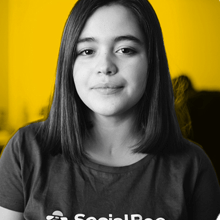
Roxana is Marketing Manager at SocialBee, she specializes in offering smart digital marketing solutions for business owners, entrepreneurs, marketers, and agencies.
Roxana’s 2021 marketing predictions & trends:
"Data-driven marketing will be one of the biggest assets for marketers in 2021. This will not only enable marketers to observe trends but also diagnose problems more efficiently. Not to mention that goal-setting becomes a more powerful process when it’s based on real data and numbers.
Lastly, by having more context on the various touchpoints and behavioral patterns of the users, even the targeting strategies improve, the messages are more personalized and sales can get a major boost."
Follow Roxana on Twitter @RoxanaMotoc and on Linkedin Roxana Motoc
Tom McNamara

Tom is CEO at Apex Privacy, they specialize in creating data privacy compliance strategies to future proof client’s businesses.
Tom's 2021 marketing predictions & trends:
"Privacy laws such as the GDPR and CCPA have made businesses really look at how they collect and use data. In light of this Google has announced that it will follow Apple, Microsoft and Mozilla and will no longer allow third party tracking cookies by 2022.
Marketers will need to focus on first party data when developing campaigns and building strategies for the future or move to less targeted campaigns. It is estimated that advertisements based on first party data only reaches 30-40% of those based on third-party cookies.
This should see big shifts in strategy from third party data to first party data and incentivizing customers to share their data with you in a legal way should be a priority."
Follow Thomas on Twitter @tommymc_5 and on Linkedin Tom McNamara
Corey McCarthy

Corey is CMO at Postal.io. Postal is an experience marketing platform that automates and fulfills the art of gifting. Curated virtual events drive attendance and engagement with physical event kits delivered to attendee's front door.
Postal targets marketers, sales teams, customer success, HR and anyone else that needs a virtual swag and gift closet.
Corey’s 2021 marketing predictions & trends:
"It isn't being talked about much yet but with third party cookies going away in April of 2022, marketers are going to have to level up their data game with a focus on first party data. It isn't just our systems that need to be considered. As we rethink our channel strategy. Some old school channels like direct mail have already been trending and will see a renaissance.
The continued evolution of virtual events is a necessity. Now that we have more time to properly plan, I think we will see some great advancements in production value, creativity, data and the tech behind it. To attract attendees in this fog of Zoom fatigue, events will need to deliver exciting activities and unique touch points that are physically sent to people's homes.
If virtual event content, speakers and experiences are compelling enough, marketers can successfully attract their target personas with invitations to attend and transition the hard work of hosting an event into a community that is active all year. Communities are a great way to keep customers, prospects and partners authentically engaged with their peers and your content. The best part of a community - it is all first party data.
The trick to all of this is optimizing for the customer experience. As we rethink our channels, marketers will need to keep CX in the forefront of their planning as we build personal connections with our personas."
Follow Corey on Twitter @testarossa4 and on Linkedin Corey McCarthy
Tanmay Guha Roy

Tanmay is in charge of New Media and Marketing Communications at Abt Associates India, they specialize in research, evaluation, and program implementation in the fields of health, social and environmental policy.
Tanmay’s 2021 marketing predictions & trends:
"The key to success in today’s digital space is about being able to reach the customer at her micro-moments and use the opportunity to convert.
In 2021 we’ll see increased use of Artificial Intelligence to capture the intents or micro-moments, predict their conversion probabilities and optimize marketing efforts in a hyper-personalized and real-time manner.
This will turn marketing into a more organic exercise and help marketers to bypass ad-blockers. However, for a marketer, this will also pose a daunting challenge in making sense of data and attributing conversions when the customer’s micro-moments are distributed across platforms that don’t talk between themselves. The winning solution will be the one that can process and attribute cross-platform data and offer actionable insights."
Follow Tanmay on Twitter @Tanmayguharoy and on Linkedin Tanmay Guha Roy
Kristi Hightower

Kristi is the Founder at KHightower LLC, she works with exponential-tech companies to help them strategies their communication and marketing plans. This includes product marketing, content creation, social media marketing, community engagement and lead generation integrated with sales.
Kristi’s 2021 marketing predictions & trends:
- "Censorship, no matter which side of the aisle you sit on, it's been made obvious to the general consumer that their free speech is not guaranteed. We've seen this in the WhatsApp privacy policy update and migration to Signal, the non-profit encrypted messaging app. This means decentralized solutions are being demanded and embraced by consumers. 2021 will be the deceptive phase for blockchain-based and decentralized solutions that give people back the power over their own data. This comes down to data being a gold mine and up until now, the general public has not been given a way to win and own their data. The rise of DApps and other blockchain ecosystems will empower individuals to keep control of their data and leverage it for monetary and other transactions."
- "Bitcoin will evolve into the global reserve currency and as institutional monies continue to pour in, retail-level adoption and more B2C opportunities are going to continue to rise. The next layer of the Bitcoin blockchain adoption and development will be on the lightning layer, which allows for payments and more opportunities for applications."
- "AR/VR engaging experiences are important. A shift to remote work, virtual events and more has driven innovation in ways to connect with people. The haptic feedback sensors are improving at such a rate that real-time training and instruction is possible. We've seen it with apps like proputt.com"
- "LiDar - this tech has been buzzed about in the media recently because of its application for autonomous vehicles (although this is not a long-term solution and Elon Musk is working on a better ML version) This LiDar tech will be easily applied in consumer products to 'map areas' quickly using their smartphones (iPhone 12 is the first to have full capabilities). Imagine mapping your entire house in less than 4 minutes and then "blocking off" certain areas of your house that the IoT enabled dog-collar on your dog can't go."
Follow Kristi on Twitter @KristiHightowr and on Linkedin Kristi Hightower
Pradeepa Somasundaram

Pradeepa is Product Marketing Manager at Document360. Document360 is a SaaS knowledge base platform engineered for growing teams. They target all the verticals who are looking to have a knowledge management system internally or customer facing self-service knowledge base.
Pradeepa’s 2021 marketing predictions & trends:
"Data-driven Content Marketing had a proof point throughout the pandemic — it scaled up the ongoing journey towards effective tactics to retain, cross-sell and upsell.
When the pandemic sent businesses scrambling to find ways to reach and engage their prospects and customers. The pinpoint on analytics and customer behavior helped marketers to target the audience and make them returning customers.
Many big companies are expected to invest in this approach said to go beyond what they previously anticipated because of COVID-19, That momentum in the realm of data-driven content marketing is expected to carry over into 2021 and beyond. This will help companies to spend their budget more precisely based on the buyer persona."
Follow Pradeepa on Twitter @preeti_soma and on Linkedin Pradeepa Somasundaram
Maja Wiśniewska

Maja is PR & Content Marketing Manager at SMSAPI. They specialize in bulk SMS marketing and mobile communication dedicated to SME. They focus on e-commerce, developers and the public sector.
Maja’s 2021 marketing predictions/trends:
"It's going to be a year of uncertainties. Being a full speed marketer might be more challenging than ever, because of the reduced budgets and high sales volume expectations after the pandemic 2020.
Therefore, I hope we will lose our hearts and minds to data analysis and make decisions accordingly. Let's dive into fundamental KPIs of the company, in-depth marketing data and analyze the environment around. Keep close with other departments of your company and rely on trustworthy partners.”
Follow Maja on Twitter @MajaWisniewska0 and on Linkedin Maja Wiśniewska
Design in Marketing
Alexander Hoogewijs

Alexander is CEO at SiteManager, SiteManager is a collaborative web design platform for agencies and web professionals that want to scale their web design business. Their cloud technology empowers to build design systems that improve workflow and collaboration between designers, coders and end-clients.
Alexander’s 2021 marketing predictions & trends:
“Over the last years the no code movement has gained increased interest in web design. Numerous platforms enable end-clients and designers to create digital experiences without being dependent on coders.
I predict the rise of hybrid platforms in the coming years. These hybrid platforms will bring back the developers in the no code movement, by empowering them to build no-code libraries for designers, marketeers and end-clients.”
Follow Alexander on Twitter @alexhoogewijs and on Linkedin Alexander Hoogewijs
Lacey Miller

Lacey is Director of Marketing at the revenue analytics startup Vertify. They target marketing professionals across the globe looking to “break-up” with traditional marketing and move into a more revenue-focused strategy.
Lacey’s 2021 marketing predictions & trends:
"In 2021, we are going to see a revolt against the siloed tech stack. This will be motivated by 3 things: budgets, digital-first, and the most informed marketer we’ve ever seen.
The Informed Marketer: better data, stronger analysis, swift action - In 2021 we’re going to see a revolt against traditional marketing metrics. Because it caused tech stack bloat and siloed data, leading to half-truths and the continued rift between marketing and sales.
Data automation will be a top priority - I predict the market for it will double in 2021, as marketers look to leverage all sources of data from across the org to make revenue impacting decisions more quickly.
Budgets are forever changed - We saw a pandemic affect entire campaigns, budget allocation, and jobs. Marketing will look to connect data across the entire customer journey to make revenue impacting decisions more quickly, with less headcount and less money burned. The same tech will be the great equalizer as companies of all sizes spend on digital experiences over in-person or direct mail. Cisco predicts 75% of all cloud workloads and computing instances will come from SaaS applications fueled by SMBs."
Follow Lacey on Twitter @ellvium and on Linkedin Lacey (Devlin) Miller
Psychology in Marketing
Travis Scott

Scott is Director of Marketing ISM - Industrial Specialties Manufacturing. ISM is a B2B company and distributor of miniature fittings, filters, and valves used in a variety of markets and applications including automotive, packaging, food and beverage, and medical. Their marketing mostly targets engineers who are designing new products or need alternative components for an established design.
Travis’ 2021 marketing predictions & trends:
"Since no one can predict the future, especially after 2020, I'll stick to where my marketing focus is trending and where I assume others in the non-SaaS B2B marketing world will be as well. Our marketing is becoming more human. We realize that, even in B2B marketing, we're marketing to other humans who have emotions, are making decisions- some rational, some irrational - and are usually trying to solve bigger, more personal problems than finding a part that fits their design. They're seeking to preserve their status among their peers and manager. They're trying to get a promotion and build their career capital. A bad choice in vendor could impact that so we will be putting more emphasis on storytelling, empathy, and understanding what problems, beyond the obvious business problems, we're helping these engineers solve.
Increasing my team's understanding of psychology, influence, how and why people make decisions will be a core focal point for me in 2021.
These elements will influence how we communicate the features, benefits, and value of partnering with ISM beyond the products and services we sell. Now that digital marketing is maturing, I believe marketers will begin shifting their focus back to the basics and core tenets of marketing- understanding the people they seek to serve- and less on the tactics and shiny new MarTech platforms and tools."
Follow Travis on Twitter @509marketer and on Linkedin Travis L. Scott
Sahil Shah

Sahil is Growth Marketer at Clientjoy, he specializes in social media marketing, paid ads, brand building and community building
Sahil’s 2021 marketing predictions & trends:
"Community selling is going to get bigger this year. People like to buy from people they know. We used to call it influencer marketing, but the same is now being expected from companies.
Companies who sell products need to become their own media houses. Companies who are building communities are going to grow in 2021. Due to the pandemic, companies who led with empathy enjoyed a lot of reach and engagement, the same will continue. "
Follow Sahil on Twitter @sahilshah0801 and on Linkedin Sahil Shah
Nitesh Gupta

Nitesh is Marketing Manager at PQAI, a nonprofit open source initiative that helps inventors to do research for their patentable ideas without any cost.
Nitesh’s 2021 marketing predictions & trends:
"This year it becomes extremely crucial to understand the real why. This is what behavioral science, particularly behavioral economics is all about. It certainly tells us what people did not do that we supposed they would do. Behavioral science will forge a new frontier in the market in 2021. Most of the time people don’t say what they think and don’t do what they say. This is the real flaw.
In 2021 we might see brands and marketers using behavioral science lenses to bring the individuals to focus. Companies would be using personality trait science to predict preferences, choices, and behavior. It also includes openness to new experiences.
Companies would try to map individuals to their worldviews, deeply tied to their own, and their ingroup identities and beliefs. The aim would be to see consumers' choices and what guides their preferences and behavior."
Follow Nitesh on Linkedin Nitesh Gupta
Helen Baptist

Helen is COO at PathFactory. PathFactory is the Content Intelligence platform that helps B2B marketers understand and optimize their content, which increases content engagement and accelerates journeys that lead to sales.
Helen’s 2021 marketing predictions & trends
"Self-discovery and education before purchase of anything, whether B2C or B2B, will only continue to accelerate. Marketers will be challenged to deliver meaningful experiences at any and all interactions.
The consumerization of B2B marketing, in alignment with B2C consumption experiences like Netflix, Spotify, Amazon, Walmart will continue across all marketing channels - with websites being the single most important channel that has, to date, not delivered to expectations.
Micro-personalized journeys and content, based on where you are in the buying cycle, customer journey and maturity of relationship with a B2B and it's products, must and should be delivered in order to win. The market is crowded and there is a lot of noise. Getting and keeping someone's attention needs to be contextually relevant, managed for the full lifecycle, omnichannel and integrated. You need to know the human and their preferences first!"
Follow Helen on Twitter @helenbaptist and on Linkedin Helen Baptist
Vanhishikha Bhargava

Vanhishikha is Founder and Content Marketer at Contensify, she also has her own Marketing Consultancy. She specializes in content marketing and Contensify focuses on B2B SaaS products.
Vanhi’s 2021 marketing predictions & trends:
"Deliberate, empathetic, helpful and data-driven content marketing.
2020 changed a lot for us. But more importantly, it changed how we interact with businesses and who we interact with. We have become more deliberate about what we're purchasing, what impact it will have on us and how it adds value to us in the coming time as well, instead of just catering to a current need. With consumers becoming more and more conscious, it's time for businesses to dump their age-old sales-driven tactics like preparing a big sales deck, a pricing comparison, etc into a blender. These tactics, while still useful, will not be convincing enough to turn your audience into your customers.
Which only goes to say, if you need to read tens of articles online and watch at least a few videos before investing even $1000 into an Apple product, expect no different from your customers. You will have to invest in long-term strategies like content marketing to educate your customers. Educated customers make better purchase decisions - while it may not bring you instant ROI from your marketing campaigns, it is a sure-shot way to find stable and steady ground in the market, and not be a crashing rocketship. But then again, just about any content does not work.
You have to know your audience, you have to dig deep into data to see what they're looking for and create content that really does educate them. It's about pull-marketing and not push-marketing anymore. You try and push things too much in the face of consumers and you'll just see yourself crumbling those who are more deliberate, empathetic and helpful to the same audience."
Follow Vanhishikha on Twitter @VanhishikhaB, on Linkedin Vanhishikha Bhargava, on Instagram @vanhishikhab, and on Facebook @VanhishikhaB
Brand Marketing and Social Media
Lori Kendall

Lori is Founder at Brand + Design + Create, she’s a brand strategist, designer, and content marketer that provides creative marketing solutions for small business owners.
Lori’s 2021 marketing predictions & trends:
"2020 gave digital marketing the opportunity to shine and now that so many people have seen how effective it can be we can only expect the focus on digital marketing to increase. With a more competitive digital landscape, finding innovative solutions to cut through the clutter will be increasingly important.
Many businesses also learned the importance of having a powerful online presence driven by a cohesive and attractive brand identity. With more people encountering brands for the first time digitally, it's become necessary to have a website, social media, and digital advertising that tell a cohesive story with a visually appealing aesthetic that creates the same ambiance as an in-person experience."
Follow Lori on Linkedin Lori Kendall
Laura Scherb

Laura is Content Creator and Strategist at Four Course Media, they do photography and strategy for CPG brands in the food & beverage industry.
Laura's 2021 marketing predictions & trends:
"In 2020, life really shifted online. We saw a frantic rush to update company websites, get online POS systems up and running, and upgrade shipping capabilities. And it's a good thing that rush happened, a year later, we're still living life from inside our homes.
Instead of idly reading the paper menu of your favorite restaurant while enjoying a cocktail from the bar, you're scrolling through an Instagram post to see what the restaurant is offering for delivery that week. Instead of browsing through the supermarket aisles, you're browsing an online cart from your grocery delivery company. At Four Course, we were surprised when we noticed our food and beverage clients continuing to book shoots and ask for content, even as many businesses were cutting down on marketing budgets. That is, until we realized that they were just meeting a need. Even as restaurants sat empty and supermarkets were functioning with reduced capacity, buyers turned to social media, spending time and money shopping online. Companies needed (and still need) content for social media to keep loyal customers and engage with new ones — all through their phones.
In 2021, we're predicting a renewed focus on social-first branding. We'll see companies that have a smart, fresh social presence take the spotlight away from brands still doing things the old-fashioned way. Companies that are able to balance in-store and online marketing will dominate the market, so watch for young brands to get creative as they tackle the challenge of marketing to a world that's changing (again)."
Follow Laura and Four Course Media on Linkedin, and Instagram
Christopher Vasilis

Christopher is Founder and CEO at Woorise, they help small businesses to connect with an audience, collect leads and grow online without technical skills or a big budget.
Christopher's 2021 marketing predictions & trends:
"Marketing trends are always changing but one thing is constant: Social Media is always focusing on building relationships with your audience. Human connections are built through interaction and personalization, just shouting your messages into the void isn’t enough to build a relationship with your audience. A big part of creating a human experience depends on building authentic connections with your customer base to increase loyalty and awareness for your brand.
In 2021, business owners and brands need to focus on being authentic, users are seeking authenticity in content and brand voice rather than polished professionally edited content. People want to know the people behind the brands they interact with. Create content that shows them what happens behind the scenes and let them get to know you and your people. In 2021, engagement and connecting with the stories that matter to your audience will be key."
Follow Christopher on Linkedin Christopher Vasilis
Sandra Kamińska-Paciorek

Sandra is Digital Marketing Strategist and Marketing Manager at Nibble Video, a UK-based animation studio specialising in production of bespoke animated explainer videos, to complement business communications.
Sandra's 2021 marketing predictions & trends:
"2021 is going to be a difficult year. Many businesses will continue recovering from 2020, so the marketing game will become ever more competitive.
To stand out, brands must be more creative than ever. What was a big trend in recent years (big data and technology) will mean a little if your marketing strategy isn't compelling enough to attract potential clients in the first place.
To gain a competitive edge and win their audience's attention, I expect that many marketers will go back to the roots, where creativity played a huge part. Allocating marketing budgets towards original, out-of-box marketing activities such as producing a branded animation video will become more important than ever before to attract the right customers and diminish skyrocketing advertising costs (which are already higher than a couple of years ago). 2021 will be the year of fighting for customers, and only those brands that are creative enough to stand out will be in a position to win."
Follow Sandra on Twitter @PaciorekSandra and on Linkedin Sandra Kamińska-Paciorek
Chloe Bovia

Chloe is the Founder of Bovia & Co., she specializes in brand identity and digital marketing for small businesses in their early stages. She works with all kinds of small businesses, most commonly black entrepreneurs introducing new products and services.
Chloe’s 2021 marketing predictions & trends:
"In 2021 people’s appetites for authenticity, sincerity, and human connection with brands is going to grow, especially because so many people feel restricted from human connection during this pandemic.
With smaller brands, I highly recommend leveraging that ability to build personal connections with customers, but to be aware that boundaries still exist. The relationship is still largely transactional, so you have to be wary of the line between relatable and “too familiar.”
Younger customers - I’m talking millennials and gen z, seem to really value a personable brand, but are growingly aware of a brand that’s trying too hard. For marketers, this means recognizing your own bias and limitations. What a leap, right? But in my experience, I’ve learned that marketers as a whole tend to think we can objectively target an audience. The reality is that we bring our whole worldview to the table and that’s fine. If we’re going to truly leverage authenticity in marketing, we need to first acknowledge that we bring personal bias to the table and unpack the ways this affects our interpretations of data and people.
This isn’t to suggest that being authentic means we can only market to people who look, think, or act like us, it means being self aware enough to question your assumptions about a particular target market and challenging how you arrived at your conclusion. It means diving into how that market perceives your brand and understanding the boundaries of your particular business-to-customer relationships. What I see in practice is a lot of marketers and small businesses going out there 1) hopping on any and every trend and it makes no sense for their brand and 2) trying to relate to audiences based on assumptions and they end up sounding like bots.
If businesses want to successfully center human voice and authenticity in 2021, then they’ll need to go back to the basics and define the brand more clearly AND understand the gaps that may exist between their marketing knowledge and their actual market. Without doing that, brands run the costly risk of excluding potential customers and confusing their current ones."
Follow Instagram boviaco_marketing
Shanee Moret

Shanee is the Founder and Growth Marketing Strategist at Growth Academy, she helps successful entrepreneurs build powerful personal brands on LinkedIn to increase their impact and make a bigger difference.
Shanee’s 2021 marketing predictions & trends:
"Live video and audio are going to reign for creating and nurturing authentic connections with your online network in 2021. Clubhouse has shown just how much people are craving real conversations. I also predict many thought leaders monetizing their followings by offering exclusive membership communities.
The successful business owners & entrepreneurs who neglected their personal brands until now have realized just how imperative having a personal brand is to their social capital - so we will see more people investing in developing their personal brands."
Follow Shanee on Twitter @theshaneemoret, on Linkedin Shaneé Moret, ans on Instagram @shaneemoret
Jennifer Yassen

Jennifer is Founder and CEO at The Freed Agency, she specializes in holistic brand social and content marketing, strategy and storytelling, helping brands gain clarity and own their overall story and purpose. She loves working with lifestyle brands and music artists.
Jennifer 2021 marketing predictions & trends:
"In light of the pandemic, It gave people the opportunity to work from home, and reimagine the lives they actually want to live both professionally and personally.
Losing jobs and the commutes gave people the opportunity to work on their dreams. This included passion projects, from working on their own businesses and brands, to having the time to work on themselves, reflecting on who they want to be, and what they want out of life.
It also gave perspective on what’s really important in life - happiness, joy, connection. It became less about material things, because let’s face it those things didn’t matter as much when we were locked in our homes with nowhere to go and no one to see (except virtually of course)
Every person, business and brand has a unique story to tell, a purpose, their why, which drives them to get up every day. Every individual has something to offer, a unique perspective that they can only bring to light because it’s their perspective, seen only from their eyes.
So my prediction – with a flood of new brands, businesses and people craving more than just material things, it’s important for brands to cut through the noise and really own their story. Focus on attracting, cultivating and nurturing their ideal customers, partners and employees that further build their brand and carry out their mission. Focus on the quality because the quantity will follow. Here's my advice on how they could do this:
- At the forefront, authentic storytelling and solidifying brand values to build genuine connections. Brands need to own their “why” and story to cultivate customers through campaigns that drive emotion, connection and further cement their authentic voice to build lasting brand loyalty.
- Brands should look at themselves holistically, ensuring employees, customers, partners and business practices align with their brand values, mission and messaging. It’s important that they are who they say they are; transparency will be key. People buy from people, and the minute people sense or see inauthenticity, they could lose their most loyal customers because they will seek out someone else.
- Who does your brand serve outside of its bottom line? Consumers are expecting more from brands today, meaning how are they improving the lives of others. Their mission, who they serve, what they stand for, will all be important aspects of how they attract and retain customers in the future.
Follow Jennifer on Linkedin Jennifer Yassen and Instagram @jenniferyassen
Linda Popowytsch
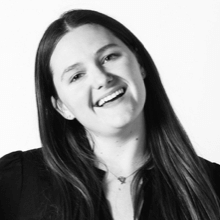
Linda is Director of Social Marketing and Public Relations at Dr. BRANDT Skincare, they specialize in safe, clinical skincare products that mirror results of in-office treatments. As a brand, they believe in an integrative approach to skincare by fostering wellbeing and healthy aging. Their target is any person who wants to take the action of caring for their skin, body and mind!
Linda's 2021 marketing predictions & trends:
"2021 is going to be all about intention and transparency. Labels have become popular in the beauty industry (especially skincare) and the misinformation surrounding these self-proclaimed “labels” is forcing consumers to educate themselves more than ever before.
It’s going to be less about statements, claims or pledges a company makes and more about actions and intentions."
Follow Linda on Linkedin Linda Popowytsch
Jessica Goodwin

Jessica is Digital Marketing Manager at White Label Studio, which is a boutique marketing agency that specializes in brand strategy, creative, social media, public relations, web design, and content marketing. Their expertise is in the home and flooring industry as well as a variety of companies including apparel and entertainment.
Jessica’s 2021 marketing predictions & trends:
"Social media marketers had big shoes to fill in 2020 with the Coronavirus Pandemic and unprecedented political unrest. This time of change has put social media in the spotlight for better or worse in an ever-changing climate. I predict we will continue to see consumers favor brands who are listening and giving back to their communities during this time of uncertainty.
Relevant and realistic social content with an empathic tone will trump the perfectly curated grids we saw a few years back. Perfection is out and attainability is in! Consumers are looking to really relate with brands and influencers beyond a pretty filter. To achieve this, marketers will need to listen, adjust their content accordingly, and simplify. Less really is more right now!
Throughout the pandemic, marketers have seen a huge increase in engagement within the home and flooring industries. This trend towards home improvement and home-centered hobbies like cooking, gardening, etc. will most likely continue in 2021. I predict Pinterest and YouTube will be huge platforms for all sorts of DIY projects. I also think it's important for marketers to include light-hearted, and even nostalgic content to bring comfort, familiarity, and laughter during these times. Yes, Instagram Reels and TikToks will continue to be popular but never underestimate the power of a basic and funny meme!"
Follow on Linkedin Jessica Goodwin and on Instagram @jessica.l.goodwin
Corinne Hone

Corinne is an Instagram Marketing Coach at Hone Your Social, she targets service-based entrepreneurs and other coaches who are looking to attract, nurture, and sell to their dream clients on the ‘gram.
Corinne’s 2021 marketing predictions & trends:
"While we’ve seen the rise of storytelling on social media in recent years, I feel like it will really take off in 2021. Whether it’s through video content (e.g. TikTok, Instagram Stories, or IGTV) or long-form copy (e.g. Instagram Posts/ Guides), storytelling is a fantastic tool to use if you want to sell your products/ services in an authentic and engaging way.
Using storytelling in your marketing allows you to engage with your audience and immerse them in your brand. If you want to build your relationship and connection with your Dream Client while boosting sales, consider including the story of your brand in all your marketing efforts this year."
Follow Corinne on Linkedin Corinne Hone and on Instagram @hone.your.social
Jessy Grossman

Jessy is Founder and President at Women In Influencer Marketing, which is a networking organization for women on the industry side of influencer marketing. They have a membership collective that shares castings, job listings, hosts virtual events and cultivates an online community of supportive female practitioners.
Jessy’s 2021 marketing predictions & trends:
"Clubhouse is an interesting platform but will not be a place for brands. Instead, it’s a great place for networking and education.
TikTok and Instagram are still the place to be for brand partnerships. I also predict that brands will explore partnerships that are about hard hitting topics."
Follow Jessy on Linkedin Jessy Grossman and on Instagram @iamwiim
Tina Todorovic

Tina is Co-founder and CEO at SocialWebSuite, which is a social media tool deeply integrated with WordPress and recommended by the biggest hosting companies. They are helping small businesses as well as large corporations with their social media marketing.
Tina’s 2021 marketing predictions & trends:
“I believe that LinkedIn marketing will be on the rise in 2021. They made a lot of nice features in 2020 that will help small businesses better market to their customers.
However, Facebook will probably still be the #1 platform for marketers, but it will be interesting to see what will happen in 2022.
The one thing that I would like to suggest to all brands is to make interactions with their customers more humane. Be empathetic, transparent, and even vulnerable. Due to everything that happened to us, now is more than ever, important to show you care. In simple terms - be yourself when posting to social networks. You can use Social Web Suite for posting, of course :-)."
Follow Tina on Linkedin Tina Todorovic
Carmen Meculescu

Carmen is Digital Marketing Strategist at SmartBill. SmartBill is a FinTech company from Romania, providing SaaS-based services to small and medium-sized businesses for invoicing, inventory management and accounting. The cloud-based platform is used by more than 50, 000 companies, which establishes it as the market leader in its home country.
Carmen’s 2021 marketing predictions & trends:
“As cliché as this may sound, I think that in 2021, perhaps more than ever, marketing is going to revolve around empathy. Most of what we have learned throughout 2020 will still be applicable: community involvement, building trust, user generated content, brands that come across as understanding better realities that their customers are facing and even show a bit of vulnerability. Furthermore, brand activism is going to be a hot topic in a polarized society.
Since the beginning, SmartBill has aimed to be the Romanian entrepreneur’s best friend and as we all know it, a friend in need is a friend indeed. With the current situation, some of our SMBs friends could use a bit of support, so we tried to provide that by both developing specific product features to assist them in navigating uncertainty and by offering users a series of #crisisresources, such as educational videos (webinars and conferences for the entrepreneurs) and business tools like the SMEs Barometer. We also adjusted our tone of voice and we adapted the messages across all channels. For example words like ‘whenever’ ‘from wherever” became ‘from home’, ‘safely’ during the lockdown.
Cookie-less marketing - Facebook’s limit for the number of ads a page can run and Apple’s iOS 14 update are some of the challenges that us marketers are going to face in 2021. As a result, we will most likely have to get more accurate tracking and better content.”
Follow Carmen on Linkedin Carmen Meculescu
Alicia Branham

Alicia is a Chief Creative Officer and Marketer at Bran Marketing, they specialize in the flow control industry and work with a variety of clients.
Alicia’s 2021 marketing predictions & trends:
“2020 was a great year for Bran and it wasn’t because of COVID. Strategic planning on targeted clients paid off for us.
The commercial valve market is holding strong through 2020, and 2021 does not show any signs of slowing down.
The industrial side of our industry, the oil field side did take a huge hit in 2020 and is barely getting a pulse back in 2021. That industry still has many challenges and is unpredictable at the moment.
I think overall we will see more companies realizing that they can no longer put off spending money on their brand and online presence if they want to compete in today's new marketplace.”
Follow Alicia on Twitter @allyg6868 and on Linkedin Alicia Branham
General Marketing
Russ Somers

Russ is VP Marketing at TrustRadius. TrustRadius is a B2B review site helping over 1.2 million visitors monthly make serious technology decisions. They help technology vendors connect with and influence target audiences through content, tools, intent data, and more.
Russ’ 2021 marketing predictions & trends:
“One of the more cheerful predictions I can make, based on data from our audience, is that spending on marketing technology is going to rebound. 56% of our buyers said it would return to pre-pandemic levels or increase, and only 17% expect a decrease.
That spend won't be evenly distributed, though, for two reasons. First, there are big demographic shifts afoot. 60% of buyers (including in the enterprise) are Millennials now, and they listen to each other - not to marketers. Second, the pandemic has permanently changed the way we work, accelerating the trend towards buyers wanting to self-serve on their buying journey. So those two trends mean that marketers that turn their customers into advocates and really work to understand the detailed signals from intent data (rather than using intent as a blunt instrument) will do very well indeed.”
Follow Russ on Twitter @rsomers and on Linkedin Russ Somers
Abhi Jadhav

Abhi is the Founder at Bay Leaf Digital, which is a SaaS digital marketing agency. They help B2B SaaS companies grow through their unique growth marketing process. They service SaaS companies that are either pre-product market fit, those that have proven their SaaS model and are emerging, or those that are transitioning from an on-premise solution to a SaaS solution with an intent to expand their market reach.
Abhi’s 2021 marketing predictions & trends:
"While the large, remote workforce enabling SaaS companies did well in 2020, most other SaaS companies held off on investing in marketing during the height of the pandemic. With additional stimulus and vaccine rollout, we are already seeing and expecting demand for digital marketing to surge in 2021. As a result, bidding for eyeballs and attention will get more expensive.
As marketers, we need to become very fine practitioners of our art so we can continue to deliver value while cutting through the elevated noise of every other company trying to get attention in 2021. Good luck to every digital marketer out there!"
Follow Abhi on Twitter @AbhiJadhavNow and on Linkedin Abhi Jadhav
Ishaan Shakunt

Ishaan is Founder and Marketing Consultant at Spear Growth, he helps startups launch digital marketing initiatives, including strategy, set up, ROI and scaling.
Ishaan’s 2021 marketing predictions & trends:
- There will be a lot more talk about Category creation among execs.
- There will be a continued increase in companies adapting MarTech (and not finding the right people to be able to do it).
- There will be an increased focus on communities and email lists.
- There will be way too many digital events. There will be some new trend to actually make this feasible.
- More companies will try to get into podcasting.
- Influencer marketing will continue to grow and evolve.
- More brands will delve into storytelling.
Follow Ishaan on Twitter @ishaanshakunt and on Linkedin Ishaan Shakunt
Kinga Edwards

Kinga is Owner of the SaaS Marketing Agency Brainy Bees, they do SaaS content marketing and PR.
Kinga’s 2021 marketing predictions & trends:
- Growing importance of the community - Already in 2019, during the F8 conference, Mark Zuckerberg said that "groups are at the heart of the experience". Community building is not a new trend, but microcommunities are. I foresee the construction of groups and "pods" (small interest circles) focused on niches.
- Modifying the formula of online events - 2020 forced changes for the conference organizers and the formula for organizing events changed, transferring all initiatives to be online. However, not everyone coped with the challenge of transferring, not so much the content or presentation, but the networking. In my opinion in 2020 there will be an emphasis on better networking and user involvement, as well as more targeted promotion. Events can take the form of round tables, debates, breakout rooms for 10-15 people. Large conferences or webinars will also do quite well, but the audience will require even better online representation of offline events. It won't work without proper networking.
- Even greater synergy between the world of e-commerce and the world of social media. We already have posts with tagged products or collections on Instagram, I envision even more opportunities to cover e-commerce opportunities in communication on social media. This is an e-commerce dilemma where businesses might be forced to 'sacrifice' website traffic in favor of social media checkout.
- More thoughtful content marketing. Not only the content itself (new types, testing, analysis and optimization), but also its distribution, which often scares marketers.
Follow Kinga on Twitter @KingaOdziemek and on Linkedin Kinga (Odziemek) Edwards
Dina Taitelbaum

Dina is head of Growth at Pudding.ai, they help marketing strategists, directors, and specialists with their real-time ad creative analysis using AI technology. They combine all performance data to elevate the efficiency of work and the communication between creative & media teams. Pudding offers actionable insights and feedback that helps with future campaign strategy, identifying fatigue ads and ways to fine-tune them.
Dina’s 2021 marketing predictions & trends:
"There are several aspects of marketing and advertising that have changed over the course of 2020 that help identify potential trends for 2021. Due to COVID-19, our world has been adjusting to social distancing and work-life balance from home. Thus, in many ad creatives we can expect to see fewer images/videos with a large volume of people. It is very likely that marketing strategists are facing restrictions that result in smaller production teams, open space shots with little to no people involved.
Beyond conceptual changes to the ads, there is also a larger volume of ads in general which will likely grow further in 2021 due to the increased competition. Many companies have limited traffic to their brick & mortar location and many are focusing on digital efforts and an increase in ad spend. That being said, a lot of our customers have mentioned bringing a creative team in-house in hopes to increase ad quality and quantity while focusing on consistent branding. After all, effective branding increases awareness, loyalty, and of course, sales - that hasn't changed!
Finally, 2021 doesn't leave much room for intuition when it comes to marketing and advertising which means marketers need to use data now more than ever to increase the performance of their campaigns. A/B testing is now a luxury to many companies because it requires breaking up the campaign spend to identify the winning one."
Follow Dina on Twitter @dinxtait and on Linkedin Dina Taitelbaum
Gina Hortatsos

Gina is CMO at LogicGate, they help companies manage and mitigate corporate and operational risks posed to their organizations every day. Their audience include risk management professionals, compliance professionals, cybersecurity and infosec leaders, operations leaders, and legal and finance leaders.
Gina’s 2021 marketing predictions & trends:
"2020 taught us that you have to be ready for anything. I predict that it will be hard to predict 2021 market behavior and macro economic factors. So, do you have the right processes, listening / assessing mechanisms, and operating model in place so you can stay a step ahead of - or quickly react to - changes affecting your market?
Do you have a voice of the customer program; consistent access to market data and insights; and frequent feedback loops with your feet-on-the-street customer and prospect facing teams? Even more importantly, do you have the discipline down to collect this information, analyze it at the right times, and make changes quickly? Marketers who have a pulse on their market, the ability to quickly read and assess changes in that pulse, and rapidly adjust will thrive in 2021 and beyond."
Follow Gina on Twitter @ghortatsos and on Linkedin Gina Hortatsos
Nadia Vanderhall

Nadia is the Founder of The Brand + Bands Strategy Group. Specializing in Branding, Digital and Consumer Finance.
Nadia’s 2021 marketing predictions & trends:
"After a year like 2020, the digital landscape will be taking the lessons learned and leveraging them to better help connect brands with their audiences. There will be 3 big trends to see throughout this year: Conversation, Connection and Convenience.
When it comes to Conversation, brands (+influencers) are going to find ways to better connect with their audience, the difference will be more engagement vs the sale. Digital/Social Media has become very sell-driven which is a major turn off for people. Expect for conversations online to deepen due to the fact that more people are online vs standing in line (for certain industries).
Connection is the key to Conversation. The human like tone that brands pivoted towards during the pandemic will continue in 2021. From insightful questions to cause-driven posts and content, brands are looking to connect and convert their audience. They are learning how to 'read the room' during certain situations to not appear tone deaf, which is a smart thing to do.
Convenience is something we will see in many ways. When it comes to shopping for example Instagram is leading the way with their "shop" feature within the app. They are making it easier for small businesses to benefit within their platform by being able to sell to a large audience - a Win Win. This will be applied throughout many aspects this year.
All three are key factors when it comes to digital strategy and execution this year. When the world opens back up, these tactics will deepen the metrics and storytelling that brands are starting to lean into."
Follow Nadia on Twitter @NVKnows, on Linkedin Nadia Vanderhall and on Instagram @nvknows
Raluca Apostol

Raluca does Lead Generation, Nurturing and Campaign Marketing at Event Marketing Stars, she specializes in helping education and tech businesses grow their network, community and sales.
Raluca’s 2021 marketing predictions & trends:
"2021 will see us going back to smaller. To smaller events, tighter communities, niched segments. This isn’t to say mass marketing will become obsolete, but it won’t be the norm either. As customers become more open to working with smaller businesses, big companies will see themselves creating new divisions and brands to keep that tight knit community feeling.
Events see an even higher need to be original. Gone are the days of Spring 2020 when any online webinar had hundreds of registrations. Online content will need to provide a new angle compared to all the videos that are easily accessible now. Plus, we’ll need to put interactivity and engagement at the heart of every hybrid or online experience we develop. If attendees will only have chat and comments at their disposal to engage with others, they’ll leave the event.
We won’t see offline events come back until late summer and when they do, they will be aimed at smaller audiences. Which means we’ll need to reconsider sponsorship packages and company partnerships to provide value in new ways. Marketing targets will be to reach fewer audiences, but increase their lifetime value, especially in B2B."
Follow Raluca on Linkedin Raluca Apostol
Marta Piotrowiak

Marta is Senior Marketing Specialist at TimeCamp, a B2B SaaS company creating time tracking and billing software. Their clients are SMBs and enterprises from IT, marketing, accounting, and many other industries.
Marta’s 2021 marketing predictions & trends:
“Most of us learned in 2020 that many predictions fail, but it is still worth trying to prepare for the future. The year 2021 will be a great time to prepare for and hopefully experience going back to normal.
It will be a slow process of going back to offices, meeting friends, and going to parties. Still, many employees will still be working remotely, so marketers should consider this new lifestyle, with less in-person and more online activities. Many trends were started by the pandemic, and they won’t dissipate entirely. It will increase the significance of digital marketing compared with other channels.
Marketers in 2021 should consider making or performing at online events. These are great opportunities to reach your audience all over the world and build your brand. It is also important to get the advantage of personalized, automated marketing when face-to-face contact is limited. This trend has been present for quite a long time in marketing, but it’s accelerating now, meaning we now get more and more sophisticated tools and need to connect with clients online on a significant scale. One of the most important trends is also quality.
You won’t get many customers anymore by just providing poor quality content, non-personalized email, or social media posts with a meme that was popular two years ago. Customers are easily getting discouraged by poor marketing, and they will check your offer twice before deciding. So focus on marketing channels where you can do something outstanding instead of doing just OK in too many areas.”
Follow Marta on Linkedin Marta Piotrowiak
Volkan Kaya

Volkan is Founder and CEO at Versoly, they target marketing sites and SaaS.
Volkan’s 2021 marketing predictions & trends:
Marketers will start leveraging no/low code tools more to build products that provide value for potential customers or increase revenue from existing customers.
Free tools like HubSpot's make-my-persona are much easier to market and get leads in the top of the funnel faster.
It is possible to generate more revenue from existing customers while improving customer retention and reducing churn. Such examples include job boards like Makerpad Jobs, and courses like Moz Paid Academy. In 2021 there will also be more marketplaces connecting customers with partnered vendors.
Follow Volkan on Twitter @volkandkaya and on Linkedin Volkan Kaya
Jasna Potisek

Jasna is Founder and CEO at Undercover Marketing, they do multi-channel marketing strategy, social media marketing, paid advertising, focused on 10x business growth for clients.
Jasna’s 2021 marketing predictions & trends:
“Strategy for success is now more than ever a fusion of organic conversational marketing and paid advertising.
What are key digital marketing trends and changing consumer behavior showing us:
- You can’t rely on one channel only, you can’t rely just on organic traffic and growth and you can’t rely on paid advertising on one channel only. Instead, use a multi-channel approach and exciting fusion of different strategies and tactics that are totally adjusted to your business and your market.
- Don’t just follow trends! Test and try in real-time and then optimize to get more leads, more clients and more sales. The best approach is to go into action as soon as possible and try with real potential clients in real-time, pivot as soon as possible. Test, try, pivot, optimize and succeed.
- Know your customers and use a data-driven approach to help you find the winning formula. Use data and analytics to give you new insights and a view into the backstage of your business and your market. Then you will know what to do and the data insights will show you the way to success.”
Follow Jasna on Instagram @_jasnapotisek, on Facebook Undercover Marketing Media, and on Linkedin Jasna Potisek
Emma Downham

Emma is a Demand Generation Marketing Manager at Outfit, a B2B SaaS platform that enables enterprise brands to create on-brand content with advanced templates. In a nutshell, people with no experience in design can create content (social tiles, A4 flyers, billboards etc) within minutes and without going off brand. They target marketers and brand operation managers at enterprise companies.
Emma’s 2021 marketing predictions & trends:
We're B2B and primarily target APAC, North America and the UK. It's so interesting to be in all of those markets during this time! For North America, I think we'll see advertisers pulling back spend on traditional social platforms and paying for industry body email sends to specific verticals - so much so - industry bodies will be able to charge more and be very selective with who they work with.
In APAC, with people working back in the office, I think we'll see marketers start to head back into the events space with their spend, but be clever about post-event follow up, especially now that everyone's been forced to learn and understand webinars! In the UK, with GDPR, I believe marketers will hyper target on paid social channels and attend online events with the hope folks will opt-in.
Follow Emma on Twitter @emmagalliott and on Linkedin Emma Downham
Ahmad Alshareefi

Ahmad is Digital Marketing Consultant at Big AI Consulting, he specializes in Google & YouTube Ads targeting owners at businesses that are e-commerce, consultancies, fitness, and coaching, with annual turnover of $1M.
Ahmad’s 2021 marketing predictions & trends:
"There will be alot going on in the digital marketing world during 2021, starting with the Apple ITP update (Intelligent Tracking Prevention) and the digital migration to new platforms. Therefore there will be a big change in the customer behavior and journey. Companies will adjust to a digital first strategy which will increase the spend on paid media channels and eventually increase competition on the ad space which will drive increased prices.
Video is going to play a key role in connecting businesses & customers based on storytelling and relating to the audience. According to a study by Microsoft, the average human now has an attention span of 8 seconds. Being present and connected with potential and existing customers will be more impactful."
Follow Ahmad on Twitter @aqatei and on Linkedin Ahmad Alshareefi
Heather Bien

Heather is a Copywriter and a Content Writer, she specializes in B2B SaaS content writing. As a freelance she also works with creatives, e-commerce and retail brands on website copy, email, and content.
Heather’s 2021 marketing predictions & trends:
"2020 taught us that we can't rely on predictions because we have NO idea what's happening next week, much less next quarter. However, as anxieties and tensions continue to run high through Q1, we'll see customers yearn for a direct, human relationship with brands.
They want to know there's a living, breathing human behind the ad or email. How can you connect your team with users?
Also, think wisely before inserting yourself in conversation or moment, customers are savvy enough to see through performative promises. Instead, look for specific, on-brand opportunities where you can connect genuinely."
Follow Heather on Twitter @hmbien and on Linkedin Heather Bien
Jake Milstein

Jake is CMO at CI Security, a cybersecurity company specializing in protecting and defending mid-market organizations. Most of their customers are in healthcare and local government though they also have customers in many other sectors.
Jake’s 2021 marketing predictions & trends:
“2020 was a year when small and mid-sized organizations froze or slowed their security spending. The criminals took notice and attacks went up. In 2021, those companies are seeing what happened and looking for new security solutions, ones that don’t cost a huge amount.
I see orgs realizing that their workers will continue to WFH and looking for ways to support those workers. Gone is the idea that everyone will come back to the office in one fell swoop. Now, it’s a hybrid workforce that comes into the office sometimes, but a majority of the time is elsewhere. While companies look for ways to adapt to the new behavior, marketers will look for ways to reach those individuals. The way we reach them is less important than the content we provide. Marketers need to understand the shift in mentality, the shift in needs, and the shift in behavior for the 2021 “workplace.”
People will be less interested in being “talked at” in a webinar and more interested in interacting with colleagues and experts in on-line panels and discussions.
Another prediction is that this will be the most important year in PR and Communications ever. With COVID and Politics continuing to dominate the news cycle, stories will have to be extremely relevant and valuable to get readership/viewership. Companies will have trouble breaking into the news cycle with product announcements and the like. Instead, they need to be part of the news cycle to stay relevant. As people look for valuable news, companies will need a clear message about how they are making the world a better place. They will need to communicate clearly how they are helping, who they are helping, and why they are helping.
Marketers will be forced to get serious about security this year. The number of breaches is rising, and marketers will have to both pay attention to their own security practices and will have to add to their marketing why their product is secure. Buyers will begin shying away if a vendor cannot pass security tests.”
Follow Jake on Twitter @ContentAndFacts and on Linkedin Jake Milstein
Kevin Snow

Kevin is the Owner at Time on Target, he helps businesses plan, design and implement sales automation programs that close more sales, create happier clients and make life easier for the business owner.
Kevin’s 2021 marketing predictions & trends:
"Small businesses accelerate their digital growth - During 2020, even brick and mortar small businesses that traditionally depended on a physical presence adapted to the times and went digital. This year, small businesses will continue this trend and invest in building and maintaining an online presence. But it won’t be enough to just be online, there will be a greater emphasis on tracking the entire customer lifecycle journey online and using data to inform decision making. This will provide more opportunities for small businesses to compete with larger businesses that operate in the same markets.
Businesses will go bigger with their message but simpler in how it is conveyed - With the move from racing to your next meeting to working remotely, brands will explore new ways to get their message in front of their ideal prospects that don't get lost in the noise of already crowded mediums like social media. Podcasts, live video, and apps like clubhouse will become cornerstone tools for brands to introduce themselves to new followers but expect a more intimate experience with these events that is driven by people's desire for something that feels more personal.
Personalized video will continue to grow as a way to connect with an audience - This desire for a personalized experience will also fuel the increase in the use of personalized video. The public has become better educated in how email marketing works and the personalized emails that used to make the reader feel special are now expected as standard practice. Adding personalized video to these efforts will keep a brand's message top of mind. And let's face it. who really wants to read an email when you can click play and have the sender say it to you in their own voice."
Follow Kevin on Twitter @kevinesnow on Linkedin Kevin Snow and on Instagram @kevinesnow
Patrick Prothe

Patrick is the founder and fractional CMO at Patrick Prothe, he specializes in high growth B2B start-up technology companies particularly in the Audio, Video and Construction verticals.
Patrick’s 2021 marketing predictions & trends:
"In the SaaS world customer acquisition will continue to get harder and more costly with the proliferation of start ups vying for attention, and given it is easier than ever to develop software.
Marketers that don't make use of analytic tools will find themselves left behind by those that do. They'll need to capture more data in real time and respond faster to drive sales. Often 24 hours is too late. Customers expect near instant answers to their questions and brands need to implement tools that facilitate real-time conversations similar to B2C.
An amazing product is also no longer enough. It begins inside the company with an end to end customer experience baked into the culture. Marketing will increasingly be facilitated by the marketing department but it will require all aspects of a company to work together on the brand experience. Brands need to make their customer the hero, understanding exactly what problems they solve and why. Culture matters and it needs to be more than fancy words on a wall. Those that get this will win.
In D2C, the obvious is that online commerce will continue to increase at a greater rate sparked by the pandemic. Increased competition means brands need to work harder to cut through the noise with more fluid and engaging shopping and buying experiences.
In both B2B and B2C, customers are saturated by choice and information. Brands that make it easy to choose them will outlast those that don't. All companies need to reduce friction in their buying process."
Follow Patrick on Twitter @pprothe, on Linkedin Patrick Prothe and on Instagram @patrickprothe
Greg Elfrink

Greg is Director of Marketing at Empire Flippers, they specialize in helping people buy and sell profitable online businesses. Their target market is any entrepreneur who has built a profitable SaaS, e-commerce store, or content business and wants to get the highest possible exit for their business.
Greg’s 2021 marketing predictions & trends:
"My prediction for marketing is that video is going to become even bigger than it already is. You can see this with some of the new additions of video to Linkedin's self-serve ad program, but also with the explosion of apps like TikTok. I think more "alternative" forms of social media could stand a real shot of standing out in 2021, things like Clubhouse come to mind as a recent explosion with an audio-first format which is quite unique.
The updates to privacy and the potential fading away of cookies likely will affect things in a bigger way in 2021. This could be a real problem for those who rely on precision-driven data when scaling campaigns. I think this will likely bring back some more of the direct marketing approaches we use to see where a lot of tracking is reliant on first click attribution rather than the last click. For people in B2B selling high ticket items (such as us where a business worth $10-$12 million dollars we're marketing), I think this is actually less of a concern. Usually, as the item gets a bigger price tag, the less useful attribution is.
Nurturing remains the most important aspect of everything. We live in a constantly distracted world and that will likely only get worse. That means you need to stand out. Make your marketing engaging, useful, entertaining, and actually worth the time for the consumer to check out, whether they buy anything or not. In other words, I think it would benefit marketers to consider all of their content channels as a media company rather than as a faucet that pours out leads for them.
The more you can build a real addressable audience that loves you, the more powerful all of your marketing becomes because they'll be supporting you across all marketing channels. You can use a podcast to promote the blog, a blog to promote the podcast, a youtube to promote the other channels, etc. until soon your brand is more like a media company rather than just marketing funnels.
Brands that consider how they can help their target market before the purchase (this will usually be your product and content around the product) and help the target market AFTER the purchase with content will win. For example, when an entrepreneur sells a business with us successfully our marketing to them is not over. We have an entire email funnel set up that engages them with interesting content that lets them know what's next, how to avoid entrepreneurial depression (more common than most would think after selling their business), how to create new goals around the capital they just got and in general be there for them in the next part of their life.
The cool thing is, you can set this up and use automation tools as the primary way to help you nurture post-purchase customers into raving fans so outside of the setup, it's not a huge distraction to do this and can build quite an engaged following. It shows the customer you're there for more than just their money, you're there for the entire journey they're going on."
Follow on Linkedin Gregory Elfrink
Lisa Cutter

Lisa is Social Media Director at Amp Up My Biz, they specialize in helping entrepreneurs and business owners leverage the power of online and social media marketing to brand themselves, build their businesses, and bank more profits.
Lisa’s 2021 marketing predictions & trends:
- "Clubhouse is the social media platform that industry experts, thought leaders, and influencers are flocking to. Currently, still only available on iPhones (and iPads) and by invitation only, this Zoom podcast hybrid social app is blowing up. Topics of all kinds are being conversed about in rooms and Clubs, practically 24/7. It is literally a place with a wealth of knowledge for the taking!"
- "We're also going to see an influx of personal accounts created in one of the other new social media channels, MeWe. As people's personal Facebook and/or Instagram accounts get flagged, reported, or even disabled, the tolerance they once had after being put in Facebook "jail" is dissipating. Personal use of Facebook may steadily drop due to their strict AI coding causing issues on their platform in people's personal profiles when there are none. Much of this also has to do with censorship, which the public is not too keen on either."
- "More businesses will continue to pivot from their standard business practices to online services and offerings. This means they need to make sure they have a strong brand identity to cut through the online and social media marketing noise...now not just from their competitors, but from the many other businesses who have already pivoted to an online presence. Having a solid Integrated Marketing Strategy is the most beneficial first step they can take, so they implement their online presence in the right way to reach their ideal clients."
- "Alignable, the sort of little cousin to LinkedIn, has just launched groups this month. They are taking off and networking on this platform is definitely skyrocketing. If you're not on Alignable now, you'd better get in there."
Follow Lisa on Twitter @AmpUpMyBiz, on Linkedin Lisa Cutter and on @ampupmybiz
Afshana Diya

Afshana is CMO at WPDeveloper, which is a software product company that specializes in web development tools and currently powering 2.7 million websites from 180+ countries around the world. They help small businesses, individuals, non-technical people or anyone to make websites faster and hassle-free, mostly without using any codes.
Afshana’s 2021 marketing predictions & trends:
"1. Personalized user experience will take digital marketing to the next level and it will drive the brands forward. Marketers will continue to include real personalization and the companies will get the pressure to invest in marketing technologies to provide a personalized experience for the users.
2. Clubhouse app is the next big thing in social media. Not only for marketers, entrepreneurs, or business elites; but also for influencers, small business owners, even video content creators will start using Clubhouse.
3. Marketers will be looking closer into voice search optimization if it's not part of the SEO strategy yet."
Follow Afshana on Twitter @AfshanaDiya, on Linkedin Afshana Diya, on Instagram @afshanadiya, and check out her website at afshana.com
Amanda O'Connor

Amanda is a Social Media Strategist. She works with small businesses (especially startups) and nonprofits to expend their social media presence. She specializes in strategic planning, content creation, and engagement.
Amanda’s 2021 marketing predictions & trends:
"2021 is going to see the continuation of major shifts in marketing. With remote work here to stay and our lives become more and more digital, businesses are going to focus on building direct relationships with their customers. Instead of using organizations like Facebook and Google as gatekeepers between businesses and customers, businesses are going to directly go after their target customers and build connections. The difficulty with this is the time that is needed to build those relationships but the rewards are endless.
In the new year we are also going to see the rise of smaller businesses competing with larger businesses for the same customers. Automation makes marketing more accessible and small businesses are taking full advantage. Additionally, customers want to support small businesses now more than ever so small businesses increasing their marketing reach is beneficial. Lastly, businesses are going to be examining their marketing budgets closely and moving resources digitally. In unstable economic times, many businesses tend to cut their marketing budgets first and I'm predicting that businesses that shift more digitally will be much more successful/sustainable than businesses who make cuts.”
Follow Amanda on Linkedin Amanda O'Connor
Tim Tyrell-Smith

Tim is Chief Marketing Officer at Help Lightning, they offer B2B software in the remote video assistance space. It’s an AR-enabled, cloud-based solution. They target field service and technical support leaders in large, enterprise companies.
Tim’s 2021 marketing predictions & trends:
"1. In light of important privacy considerations spurred on by Europe's GDPR and California's CCPA, I'm expecting to see a new level of creativity and value-added programming offered to entice first-touch, opt-in decisions from business leaders. As marketers, we want to both comply with these policies and succeed in generating a relevant database of contacts to introduce our solutions. So we will need to create or be introduced to richer offers and experiences to encourage engagement.
2. Knowing that it will be continually harder to build a database going forward, marketers will spend more time and energy working to attract a smaller, better defined target (i.e. those who would more likely buy anyway). We'll spend more time building out and creating unique programs/content for those that meet our ideal customer profile (ICP) and less time attracting a more traditional high volume audience.
3. With COVID-19 as a catalyst and 12 month KPIs as proof, we will see some reduced interest and investment in on-site and in-person activities, even when we're told it's safe to come out. We will also see a slew of better enabled and importantly, better attended online events in the second half of 2021 as the supporting technology and online event agendas become more palatable in comparison with our prior expectations."
Follow Tim on Twitter @TimsStrategy and on LinkedIn Tim Tyrell-Smith
Aiyaz Uddin
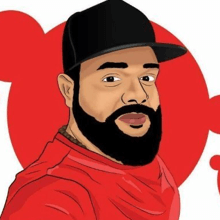
Aiyaz is Founder and Marketing Strategist at TheStaffingCircle, they target entrepreneurs, independent professionals, business owners, startups, and small businesses in need of online presence, marketing solutions, social media, PR & corporate communication, advertising and branding solutions.
Aiyaz’s 2021 marketing predictions & trends:
- 2021 will be the year of real digital transformation for the brands across the globe. Marketers and marketing automation tools will play a key role in strategizing and optimizing marketing strategy for startups, small and large businesses."
- Content creation in marketing will continue to dominate whether it is for audio, video or text based marketing."
- A lot of businesses will focus on creating inbound strategy for their businesses whether organic or paid search ad campaigns."
- Apart from traditional marketing on search engines, professional and social media platforms such as LinkedIn, Facebook, Twitter, Instagram, Tiktok, Snapchat and YouTube will help marketers reach out to a set of targeted audiences through various marketing solutions for B2B, B2C & D2C audiences."
- Content creators will be on the rise - micro influencers, podcasters, video creators and bloggers have become a part of the marketing ecosystem to market and promote products, services or solutions. As per the studies by social media today, over 70% of millennials purchasing decisions are made from recommendations of family and friends through social media contents."
- 2021 will be the year of incorporating online marketing strategy on professional and social media channels for attraction, engagement and conversions through video, audio, and text based content generated by the user and brand itself."
Follow Aiyaz on Twitter @consultayaz, on Linkedin Aiyaz Uddin, on Facebook @Consultaiyaz and on Quora Aiyaz Uddin
Ratnangi Malpekar

Ratnangi is a Marketing Strategist at Swalfie, LLC. She specializes in Digital Marketing, Strategy Definition, Execution, and Program Management.
Ratnangi’s 2021 marketing predictions & trends:
"1. Small businesses and entrepreneurs are going to need assistance in digital marketing / enhancing their digital footprint.
2. As they say 'Attention is the new currency', everyone will have to struggle to gain the attention of their target audience.
3. As mentioned by Jeremy Gutsche, entrepreneurs are going to grow a lot in the future hence automatically the competition will increase but leveraging digital marketing to reach the customers, building the relationship is a way to go.
4. If you are able to build a human connection within digital connections, that would be a successful marketing strategy."
Follow Ratnangi on Linkedin Ratnangi (Javeri) Malpekar
Marketing Operations and Work
Jesse Shiff

Jesse is Director of Marketing at Empower Africa, an Impact Business, Community and platform focused on driving investment, trade and job creation in Africa. Targeting VC, startups and enterprise corporations. Jesse is a multinational marketer that has worked globally for both enterprise companies and startups. His current focus is on growing and training marketing teams that scale.
Jesse 2021 marketing predictions & trends:
“From an operational perspective I predict that the “gig” economy in marketing will exponentially flourish. The result of so many people becoming accustomed to working from home creates renewed recognition in the power and flexibility of creating a global workforce. If anyone can work in your business from anywhere, then why not hire from anywhere? Especially if there is high quality talent at a lower cost than locally.
Companies that are offering a marketplace for freelancers will be a driver for success, which is why a company like Fiverr will have a Superbowl ad this year, they’re capturing the momentum of this shift. Even more so, developing economies are going to experience rapid digital transformation. The internet is a global equalizer and as more talented individuals from developing nations go online, they get better and quicker access to high quality free online training materials. Their living wages are much lower which will allow them to offer competitive services at a better cost. The future is global and 2021 will be a year of opportunities for those who know how to best capture the momentum.”
Follow Jesse on Twitter @JesseAShiff and Linkedin Jesse Shiff
Konstantin Yevishkin

Konstantin is Digital Strategist and Co-founder at DVZN, they specialize in Strategy as a Service for SaaS & subscription businesses.
Konstantin’s 2021 marketing predictions & trends:
- Companies will focus on 6-12 month strategic roadmaps rather than 5-10 year strategies.
- Fractional CMO is the new normal - We will witness more part-time CMOs working on a remote basis at an affordable cost.
- Niche communities as part of the Passion economy - The amount of creators launching niche communities and sharing their content with "1000 true fans" will grow. Even more people will be able to make it their full-time job in 2021.
Follow Konstantin on Twitter @yevishkin and on Linkedin Konstantin Yevishkin
David Cacik

David is CMO at CloudTalk, they offer cloud phone solutions for sales and customer service teams, focused on mid market.
David’s 2021 marketing predictions & trends:
"The shift to remote work will continue and it will bring marketers both new challenges and new opportunities. Marketers should think of ways to incorporate their customers working from different (home) environments into campaigns.
Even though the target customer remains the same, their behavior in a different work environment might alter a little."
Follow David on Twitter @david_cacik and on Linkedin David Cacik
Carly J. Cais

Carly does Marketing & Operations at ElleSpark, they work with early to mid-stage SaaS companies to grow their business from $0M to $15M ARR.
Carly’s 2021 marketing predictions & trends:
"With the pandemic still a part of daily life affecting buyer behavior, companies have had to reduce their full-time staff and make lasting cutbacks. In 2021 we will see a heavier reliance on consultants, freelancers, and outside help to bridge the gap and provide specialized expertise to downsized organizations. These outsiders will help restructure and improve the foundations of the business so that the business can stay profitable during uncertain times and be ready to hire in-house once economies rebound.
Marketing has evolved to where the approach has come full circle. First it was marketing to everyone, then it split into B2B and B2C, now it's coming back to "approach your B2B clients as if you were in the B2C market." More personalization and integration of the buyer's journey as individual into a larger B2B buyer's journey as an organization is paramount to success in a world where everyone is fighting for attention.
As Marketing becomes increasingly complex, organizing marketing assets, planning marketing initiatives, evolving marketing strategy, and staying on top of the marketing tech stack has become critical. Solutions such as Workfront, CabinetM, and Amplifi, and phrases such as DAM, Marketing System of Record, and Subscription Management - will move more into the collective consciousness and become must-haves for growing businesses."
Follow Carly on Twitter @carlyjcais and on Linkedin Carly J. Cais
Anita Brearton

Anita is Founder and CEO at CabinetM. CabinetM is a marketing technology platform that enterprise organizations use to manage their technology, performance, spend, and strategy.
Anita’s 2021 marketing predictions & trends:
"As we move into 2021 it’s clear that the pandemic is a long way from over. As marketers settle into this extended “new normal”, we’ll see a continued focus on how to engage with customers and prospects who work at home and are on video conferences all day long.
I expect to see companies refine their video engagement strategy — webinars that used to offer a nice break from a daily routine have now become one more video conference in a long day of video conferences and as such, attendance is dropping off. Video is a great medium, companies will work to find better ways to leverage video in engaging customers.
Another area of focus in 2021 will be collection and cleansing of first party data. With Google planning to eliminate 3rd party cookies by 2022, companies need to be focus on building their own robust customer personas, profiles and lists and then working to define a plan to engage with native advertising. This bodes well for the media industry."
Follow Anita on Twitter @abrearton and on Linkedin Anita Brearton
Ian Edwards

Ian is Co-founder and COO at BeeLiked, they help companies to get, keep and grow business using interactive gamified promotions and campaigns.
Ian’s 2021 marketing predictions & trends:
"As more people work remotely the drive towards engaging and motivating employees digitally will accelerate.
Marketing is no longer just advertising and branding. Marketers need a more integrated approach with other teams so they can build a more engaging end to end customer experience.
Tech will equal the playing field. The rise of marketing software as a solution (SaaS) applications will allow smaller businesses that might not otherwise be able to afford sophisticated digital marketing and engagement to go digital and drive their growth.
Today’s digital consumers are aware of the inherent value of their personal data and marketers will need to continue to adapt to GDPR, CCPA and other privacy and regulatory initiatives. More so than ever marketers will need a way to cut through the noise and create a fully-consented two way value exchange."
Follow Ian on Linkedin Ian Edwards
Zoe Hawkins

Zoe is Content Marketing Manager at Dgraph, which is an advanced graph database company. They have products for frontend developers building apps (like side projects and startups) as well as enterprise solutions for companies unifying their data for better performance and more complicated queries.
Zoe’s 2021 marketing predictions & trends:
“I believe that developer marketing, as well as "bottom-up" approaches, will accelerate in 2021. Companies will be expanding or rebuilding their teams this year, and relying on the expertise of those people who come on board to advise them on the best tools, practices, and processes.
B2B marketing will need to focus on getting buy-in from the teams that will actually use the product or service, rather than purely targeting top decision-makers and executives.
I also foresee LinkedIn gaining greater relevance as a social network, not just as a place for job seekers and sales leads, but also for connecting on key issues that resonate across companies and workplaces.”
Follow Zoe on Twitter @Moonstormer and on Linkedin Zoe Hawkins
Eric Quanstrom

Eric is CMO at Cience, it’s a B2B lead generation company focused on driving new sales opportunities for businesses large and small.
Eric’s 2021 marketing predictions & trends
This is the year that Revenue Operations moves front and center. Blending from the advances in Sales Ops and Marketing Ops roles, Revenue Ops performs the join that influences how data is collected around each sales cycle for B2B organizations.
From attribution, forecasts, to marketing / sales cycle conversion rates at every step of the buyer's journey, RevOps roles are delivering insights that enable Revenue Leaders to make better decisions around their go-to-market strategies.
Follow Eric on Twitter @EQuanstrom and on Linkedin Eric Quanstrom
Kirti Dewan

Kirti is VP of Marketing at Bugsnag, they specialize in error monitoring and application stability management. They target mobile and web application engineering organizations
Kirti’s 2021 marketing predictions & trends:
"Quality over quantity will matter more than ever before.
The role of marketing organizations is changing. They are being viewed more as demand generators and less as lead generators. Marketing teams are making sure they are shaping their market in their voice. The marketing mix along with product marketing work is being used to achieve outcomes across the entire funnel. As the breadth and depth of the marketing function grows, it can be easy to lose focus. Examples of diluted focus can show up, say, in the implementation of a martech tool, in the ABM campaign targets' definition, or in joint Marketing and Sales programs. In spite of good intentions, Marketing is expected to deliver a target lead volume by funnel stage or by program source.
To achieve tightness in the GTM engine, Marketing teams will develop a laser-focused approach and build for quality over quantity in 2021. This will help GTM and Rev Ops in key ways:
- Funnel and levers' management: Teams will keenly measure conversion rates across the funnel, closely monitor lead scoring, and study gates and triggers as opposed to going down the path of 'we need to create more pipeline'
- Engagement through community: With the lack of human interaction in virtual events, teams will focus on more intimate, quality events to include their primary audience
- ICP development: A sharper focus on continual tracking and measurement and two-ways syncs between Sales and Marketing will make teams comfortable with targeting those who matter
- GTM alignment: With both Sales and Marketing teams rallying around shared goals, the planning and execution of programs and plays will be integrated and of high quality"
Follow Kisti on Linkedin Kirti Dewan
Kathleen Booth

Kathleen is VP of Marketing at Clean.io, it’s a digital engagement security platform that helps businesses protect their brand, revenue and users' experience.
Kathleen’s 2021 marketing predictions & trends:
“I predict that in 2021 marketers will be forced to take security seriously. With marketing increasingly owning spend on the business tech stack, and as more businesses shift to digital due to COVID, it will be critical to ensure the interactions that businesses have with their users, customers and audiences are safe, secure and optimized while also ensuring that marketing activities don't put the business at risk.
From understanding how to build a secure website, to creating social media posts that don't provide bad actors the information needed to craft phishing attacks and vetting the plugins and third party tools that marketing teams use and integrate, there's a huge learning curve that will need to be overcome for marketers to gain fluency in marketing security. The cost of not doing so is enormous both financially and from a brand equity standpoint.”
Follow Kathleen on Twitter @WorkMommyWork and on Linkedin Kathleen Booth
Nichole Elizabeth DeMeré

Nichole is a B2B SaaS Consultant, she works with B2B SaaS Founders.
Nichole’s 2021 marketing predictions & trends:
"Customer Success is essential to SaaS marketing because there’s a focus on retention and CLV since it’s subscription-based, so we’ll see an increase in spend for Customer Success platforms, as well as educational content like webinars, teach-ins, knowledge bases, etc. There will be an increased focus on it for both SaaS and e-commerce.
We were already headed in this direction but the pandemic has accelerated this focus as more people are offering online services and also buying/selling products online."
Follow Nichole on Twitter @NikkiElizDemere, LinkedIn Nichole Elizabeth DeMeré, and Instagram @nicholeelizabethdemere
E-Commerce Marketing
Sarah Clarke DM

Sarah is Owner and Media Strategist at Dufferin Media, she specializes in helping business owners develop and implement strategies using Digital Marketing tools that accelerate them towards success.
Sarah's 2021 marketing predictions & trends:
"In 2021 we are going to see the increase in popularity of informal video in digital marketing. This is largely being fueled by the popularity of TikTok, as well as Instagram Reels. Social Media users love to consume this type of content because it is authentic, fun, and human. Businesses that start including this style of video content in their marketing strategy should expect more engagement from their audience if this medium is used right. Not to sell, but to connect in new and meaningful ways.
Secondly I strongly believe that e-Commerce will continue to explode as more consumers purchase online forcing more businesses to offer e-commerce solutions in some form to stay competitive. Many businesses that previously never imagined they could offer their products or services online are being encouraged to consider e-commerce as a solution during the recent pandemic as so many businesses had to physically close in lockdowns. The benefit of expanding to e-commerce can be enormous to small, local, businesses that now can market Worldwide."
Follow Sarah on Twitter Sarah Clarke - Media Strategist, on Linkedin Sarah Clarke, on Instagram @sarahclarkebiz and on Facebook @sarahclarkebiz
Rachel Allen

Rachel is a Brand Manager BISSELL and founder at Women in Marketing Connecting Facebook Group
Rachel’s 2021 marketing predictions/trends:
"With the increased presence of digital marketing, we have seen the consumer's needs change and evolve.
There are a ton of statistics available about what percentage of sales are influenced digitally. Depending on the industry, most statistics reference over 50% of sales are influenced digitally.
The consumer’s need for customized offerings continues to increase as they search for that personalized solution to fit their individual needs. We have all seen advertising and messaging continue to become more customized with targeted content that feels like it was created for each individual.
This type of content is now the expectation of the consumer when presented with a promotional offering. We will continue to see this trend grow and flourish, because the consumer is not only looking for a personalized solution, but the feeling that they are connected. When we can speak to the consumer in a personal way, the connection created draws them to the product, service or brand.
While we have seen the strong shift to e-commerce from traditional brick and mortar, COVID accelerated that shift dramatically. The magnitude of the shift to e-commerce is something we did not expect for years to come. Consumers are now looking for convenience even more in their shopping. We saw the explosion in Amazon, delivery and curb-side pickup in 2020. In CPG, e-commerce and new delivery channels have increased +100% with the onset of COVID. As consumers were somewhat forced into new ways of shopping, they have adapted and created new routines.
The e-commerce market share continues to grow at this new elevated level. With this stronghold, we anticipate consumers will continue to embrace the convenience of e-commerce and these new delivery services that have emerged. Not only will the new normal that consumers have adopted in 2020 stay, but they will also be quicker to embrace new trends that provide them convenient solutions to their purchasing needs."
Follow Rachel on Linkedin Rachel Allen
Iwona Polak

Iwona is Head of Marketing at NapoleonCat, they provide a social media management and analysis tool, serving social media professionals mostly from the eCommerce sector.
Iwona’s 2021 marketing predictions & trends:
In response to the new pandemic reality, Instagram unveiled a couple of commerce-friendly features that allow users to discover brands and shop directly on the platform of their daily use. Shoppable posts, Instagram Shopping, gift cards, live streams, and support small business stickers - just to mention a few - are features that gained huge popularity in 2020 and they're already widely used by brands and creators all over the social media platform. We believe that
2021 will only reinforce the trend and Instagram will become one of the leading marketplaces in the world. All eyes on Instagram, retail and eCommerce professionals! Or should I rather say "iCommerce" (Instagram+commerce) professionals?
Follow Iwona on Linkedin Iwona (Radzimirska) Polak
Harrison Baron

Harrison is Founder & CEO at Growth-Generators.com, specializing in SEO and organic growth. They do an in depth analysis of where companies are and where they want to be.
Their target market is technology companies, specifically IT companies, but they also find great success in working with a variety of businesses that are focused on using technology to grow.
Harrison’s 2021 marketing predictions & trends:
"I think there are going to be two major shifts coming for 2021 and moving forward.
Because of the pandemic, buying in brick and mortar stores will continue to decline. The vast majority of business is going to be done online. This, I believe, will exclude buying products such as household appliances and physically larger items. Customers enjoy seeing and interacting with the product before they make a purchasing decision. This will only increase the importance of having a website that is user friendly, easy to find, and answers the questions people are asking online. People will be searching more for reviews online and actively looking for videos giving them the information they are looking for.
The second shift will be new websites, and small online stores are going to be at an all-time high. This past year we have built a record number of websites and countless e-commerce stores. They are all competing for attention, and we don’t see any slowdown of e-commerce stores being made. The challenge is most of them are selling generic products without differentiation from the next. Building an audience for people to come back time and time again is going to be critical to driving consumers to your brand."
Follow Harrison on Linkedin Harrison Baron and on Instagram @baronmediagroup
Monica Bansal

Monica is Marketing Director at HustlerMarketing, they are a specialist e-commerce email marketing agency. Their target audience is e-commerce businesses doing at least $50k in monthly revenue.
Monica’s 2021 marketing predictions & trends:
1) "Video is going to continue to rule and some of the most conventionally "text-dominant" content is going to go video. Most of the conventional content that was earlier done in a blog or text format can move into video. For eg. company reports don't have to be 25 pages long. They can be in the form of a video infographic and pushed on social media."
2) "Email marketing is going to get stronger. Social networks are getting unpredictable, the sudden and unexpected bans on ad accounts, political climate, and rising ad costs is going to encourage businesses to build and own their networks. The email list is going to be worth its price in gold, and hence email marketing is going to be more sophisticated and nuanced."
3) "Meaningful influencer marketing is going to take precedence over mindless sponsorships. As social media matures and influencers start owning niches, brands are going to be engaging influencers to create longform and thoughtful content that organically ties into their original content rather than a force-fed association just to cash in on the number of followers."
Follow Monica on Twitter @desiboho and on Linkedin Monica Bansal
Product Marketing
Cindy Berman

Cindy does Product Marketing at Productboard, her role is very comprehensive where her responsibilities include growth (website and in-app) and core product marketing for all products. She leads all product launches for the company, works on pricing and packaging, ecosystem and APIs marketing, market research, messaging and positioning, product enablement, and product and partner campaigns.
Productboard is a leading product management system, helping product teams at B2B and B2C customers (from SMBs to Fortune 500 companies) get the right products to market. Over 3,000 modern, customer-driven companies - like Zendesk, UiPath, Avast, and Microsoft - use Productboard to help understand what users need, prioritize what to build next, and rally everyone around the roadmap.
Cindy’s 2021 marketing predictions & trends:
"Product marketing is a highly cross-functional role that works closely with product managers, marketing, sales, customer success, business development, design, and even engineering. With the increase in distributed teams and the continuation of remote work or hybrid models with COVID-19, the need for effective and closer virtual collaboration continues to grow. In 2021, product marketers will continue to use more collaborative tools to effectively and frequently partner with stakeholders.
For example, product marketers will use dedicated product management systems, like Productboard, to stay in sync with product management teams. They’ll be able to capture and analyze customer feedback, see and influence an updated and dynamic roadmap, prepare for product launches, and capture and analyze win-loss notes and competitive analysis all in one system. When working with design teams, product marketers will asynchronously use tools like Figma and Miro more frequently. They no longer need to use outdated tools not up to the job or schedule another in-person meeting.
And what good is collaboration without effective communication? The key to a successful product marketing and product management partnership is effective communication, which often involves many weekly meetings, including weekly product launch meetings. By using tools, including Vowel, a video conferencing tool that makes meetings better, product marketers can ensure nothing misses the mark during a time of growing stress and lean teams. Product marketers will improve the quality of their meetings and cross-functional communication with tools like Vowel. As Vowel transcribes and can share each meeting, product marketers will have improved product launch brainstorming and planning.
Furthermore, as product marketing and the importance of the role continues to grow, CEOs have increasingly hired Chief Marketing Officers and VPs or Heads of Marketing with more product marketing experience. This trend will continue in 2021, following such leaders as Jamie Domenici, CMO of LogMein, Keith Messick, SVP of Marketing at LaunchDarkly, Giancarlo “GI” Lionetti, CMO at Confluent, and Matt Epstein, CMO at Rippling."
Follow Cindy on Twitter @cingirl30 and on Linkedin Cindy Berman
Abby Barsky

Abby is Head of Marketing at Cord. Cord is a there-when-you-need-it Chrome extension that adds the ability to collaborate inside the software where we actually do the work, whether that's an analytics dashboard, email campaign, or CRM. Marketers will wish all tools were built this way in the first place.
Abby’s 2021 marketing predictions & trends:
"Marketers will continue to work deeply in other functions' SaaS tools to collaborate: Giving feedback on designs in Figma, creating bug reports in GitHub, participating in product roadmap sessions with Miro boards, and more.
Because of this, we will see a rise in horizontal collaboration. We'll keep using all of our favorite tools, but no longer in isolation. We'll see SaaS collaboration tools that help us stay focused and calm with an easy-to-use, single inbox. They'll also add best-in-class commenting, mentioning, and annotating, similar to what Figma and Google Docs have now, but across the dozens of other SaaS we use everyday."
Follow Abby on Twitter @abbybarsky and on Linkedin Abby Barsky
Shannon Howard

Shannon is a Growth Product Manager at The Predictive Index. The Predictive Index helps businesses make better hires, improve company culture, and boost employee engagement. They target businesses with 50-1,000 employees that are struggling with low engagement and high turnover.
Shannon’s 2021 marketing predictions & trends:
"With COVID still looming and economic uncertainty, marketing teams are going to be heavily focused on customer marketing and retention.
We've long known that the cost to upsell or cross-sell an existing customer is less than the cost to acquire a new customer, but 2021 will be the year we start to think more seriously about engagement and retention strategies."
Follow Shannon on Linkedin Shannon Howard
Nicholas Walsh
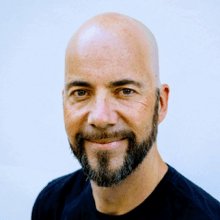
Nicholas is Chief Marketing Officer at Range. Range makes software that helps teams work better together. Managers and teams at companies like Twitter, Medium, and Mozilla use Range to stay more connected, focused, and productive.
Nicholas’ 2021 marketing predictions & trends:
"Everyone will need to be a (quality) publishing empire. While the old adage of "content is king" was embraced long ago by the B2C world, B2B adopted this mantra in a major way in the last five years, and B2B brands with outstanding content teams and voices will increasingly separate themselves from the pack. Quality will increase. Content agencies with the right mix of insights, editorial, and engaging writing will be able to charge bigger premiums.
Marketers will get better at turning their audiences into their marketing team. They'll develop better ways to ask their audiences what they want, then demonstrate they're listening, and establish a dialog that serves to recruit those same audiences to be active participants in marketing the product and shaping the narrative beyond just word of mouth.
Better remote teamwork processes and apps (like Range) will connect marketing and engineering teams in ways that lead to much better work, no matter where teams are working. Silos between creative, marketing, and engineering will break down even more, giving rise to better engineering-as-marketing experiences, and helping drive product-led growth."
Follow Nicholas and Range on Twitter @RangeDotCo and on Linkedin Nicholas Walsh
